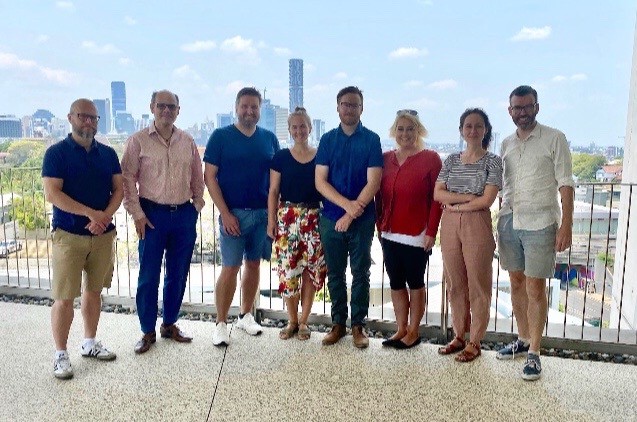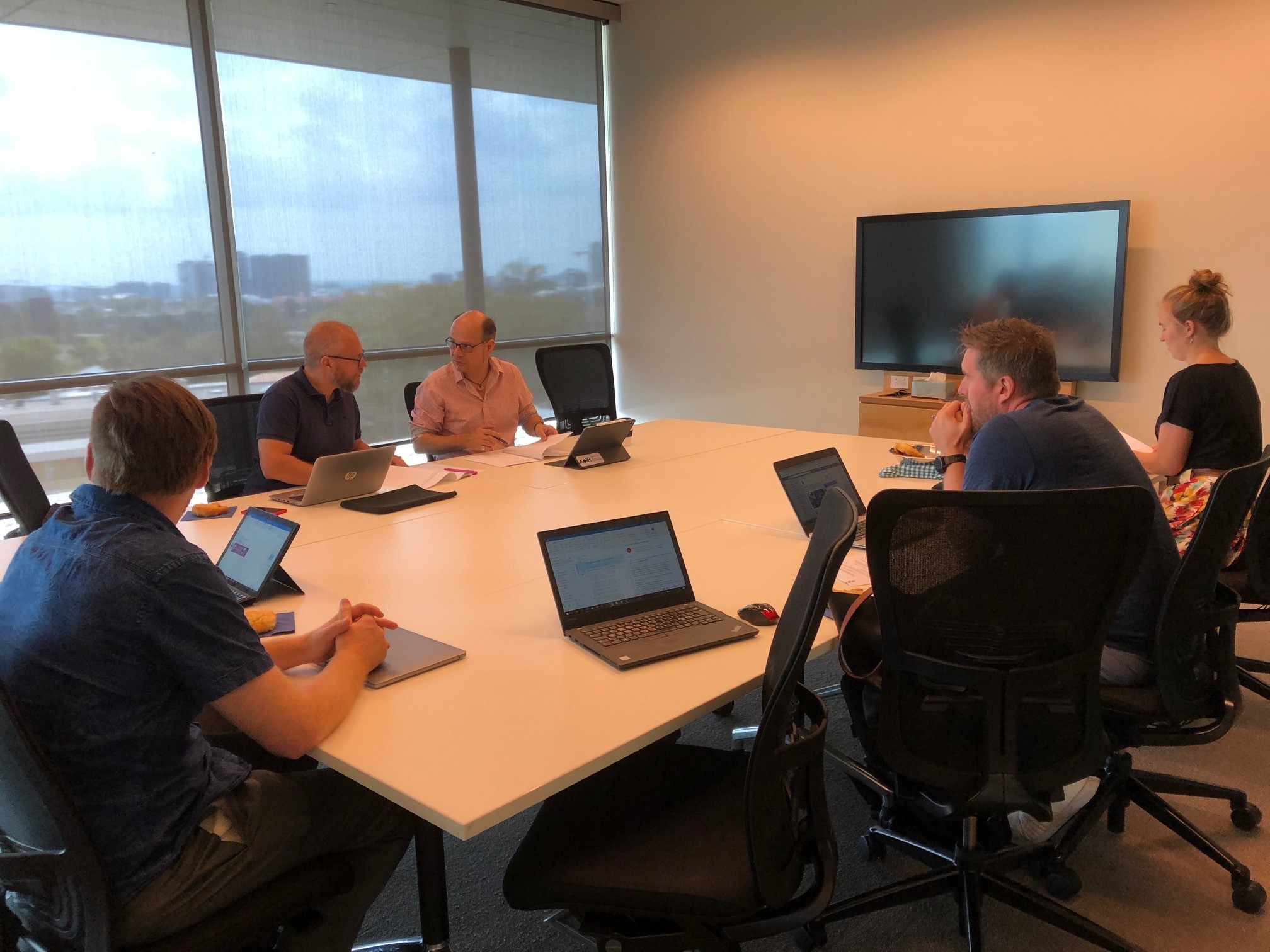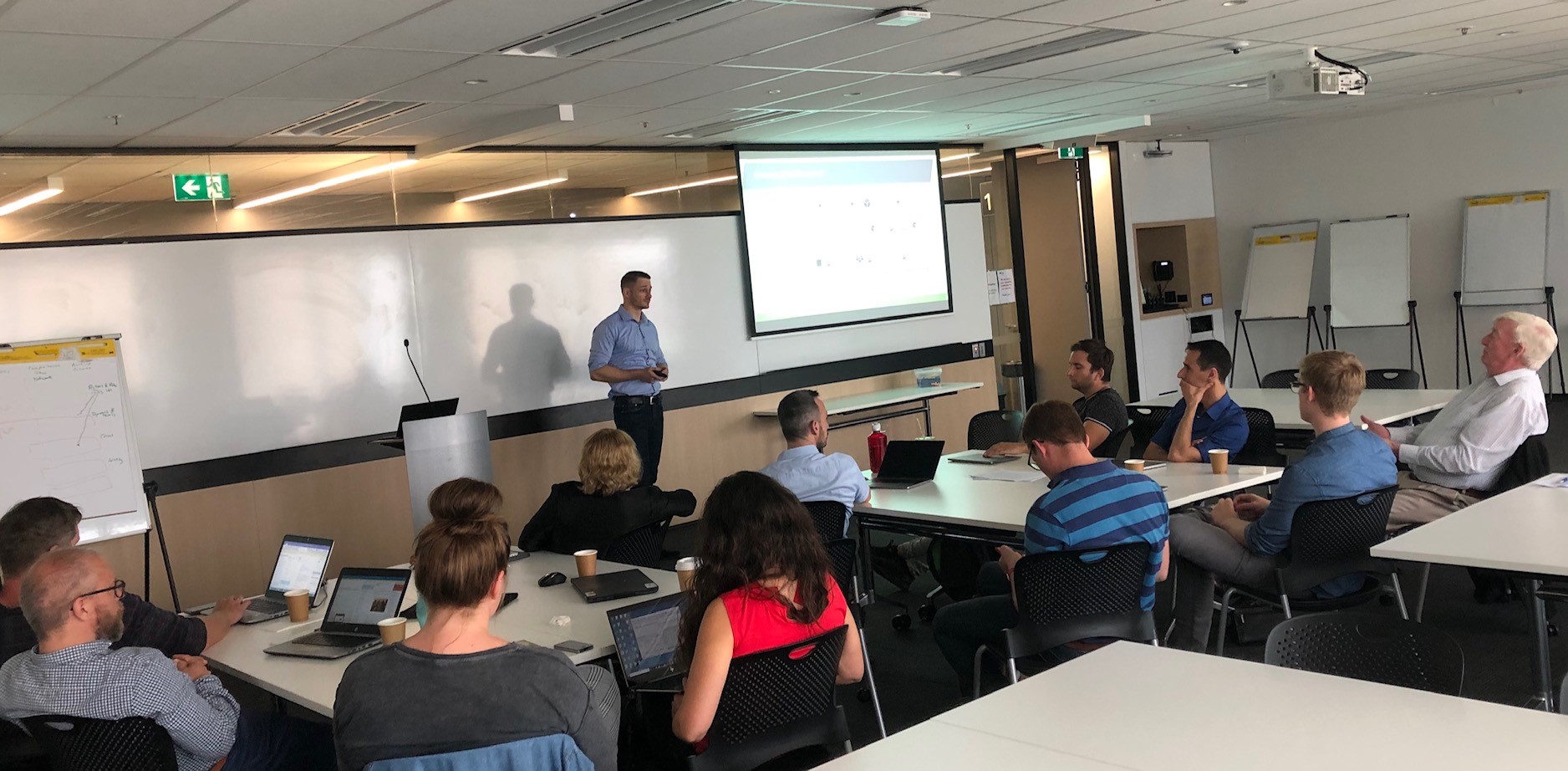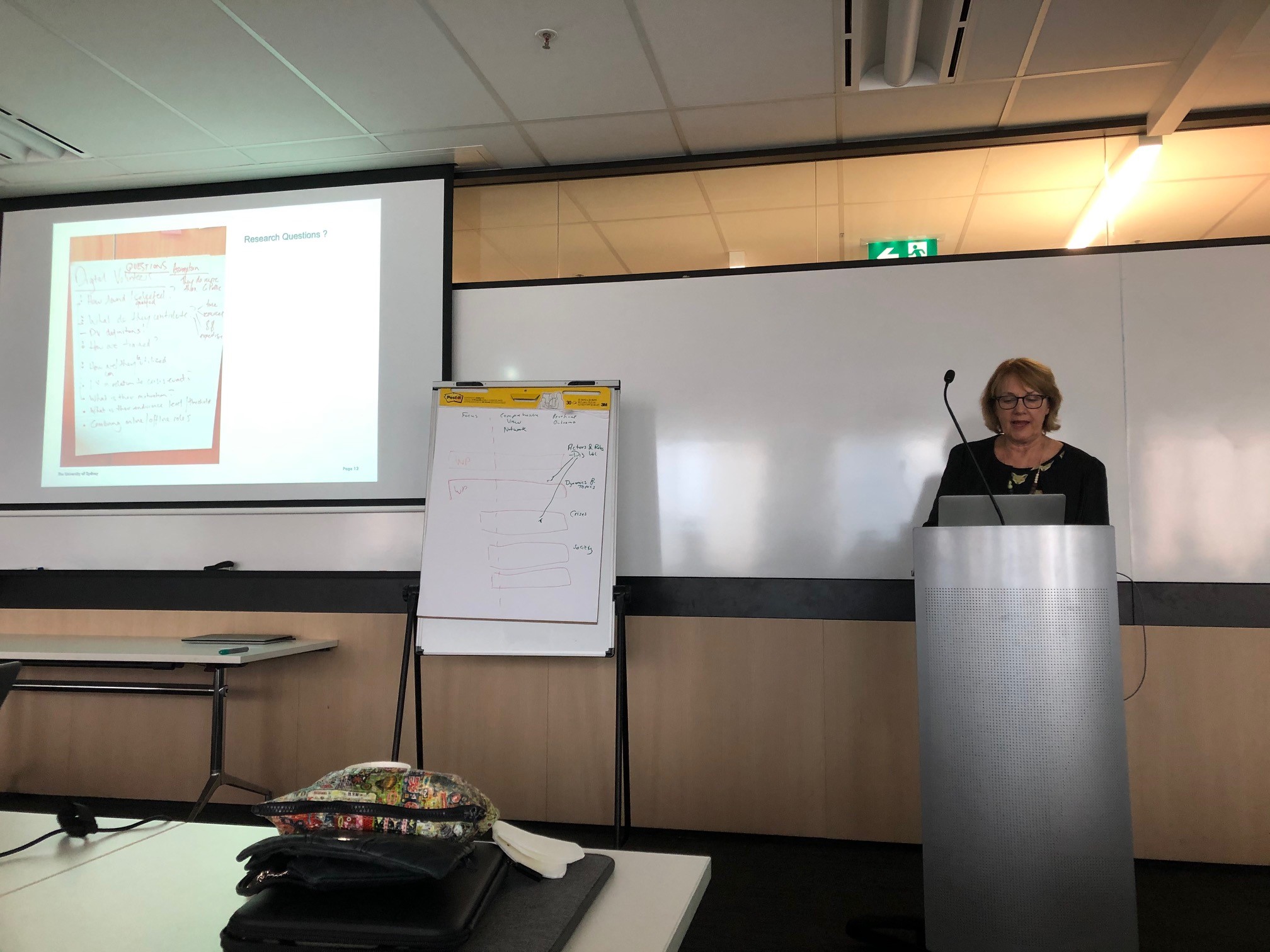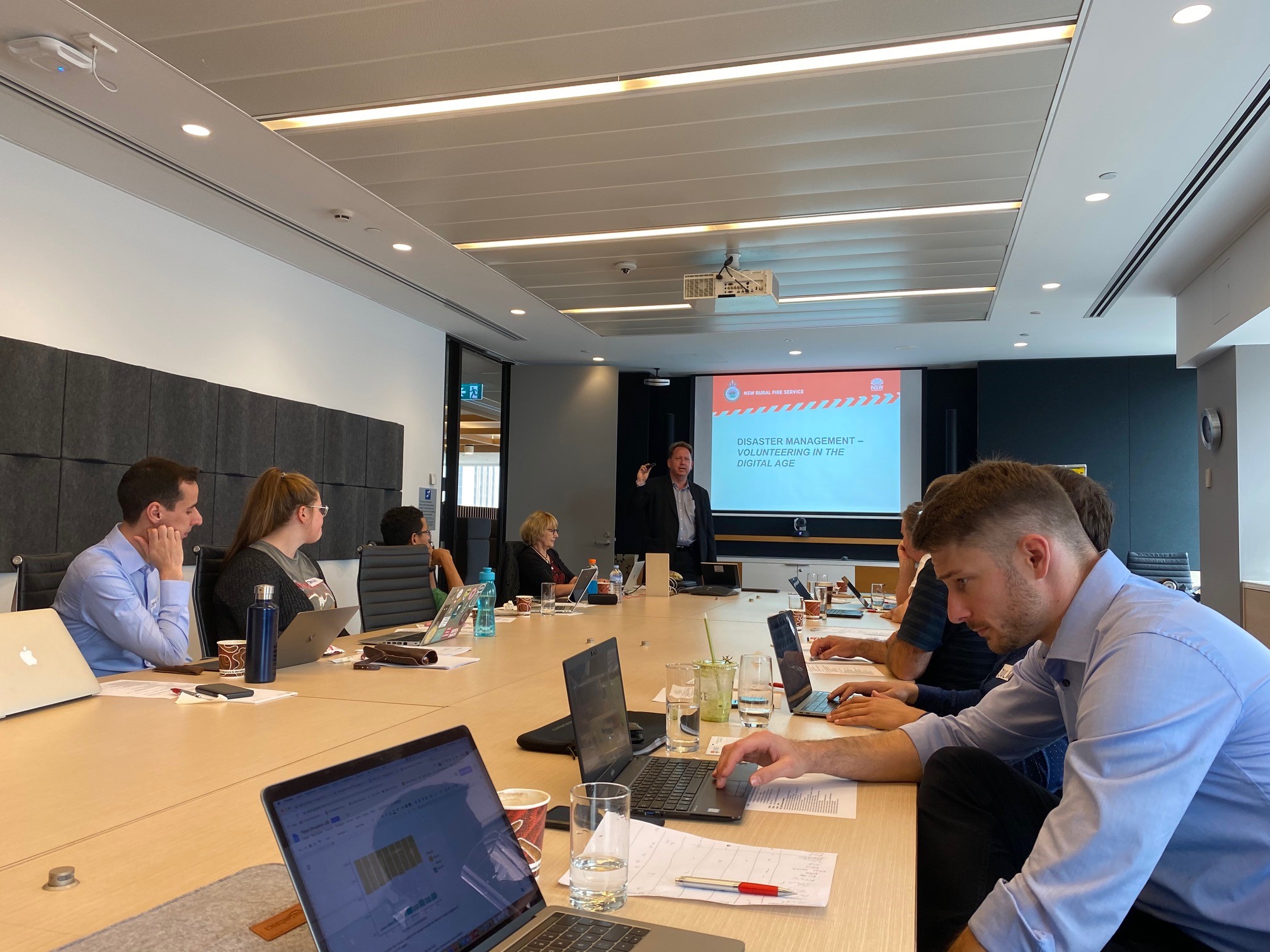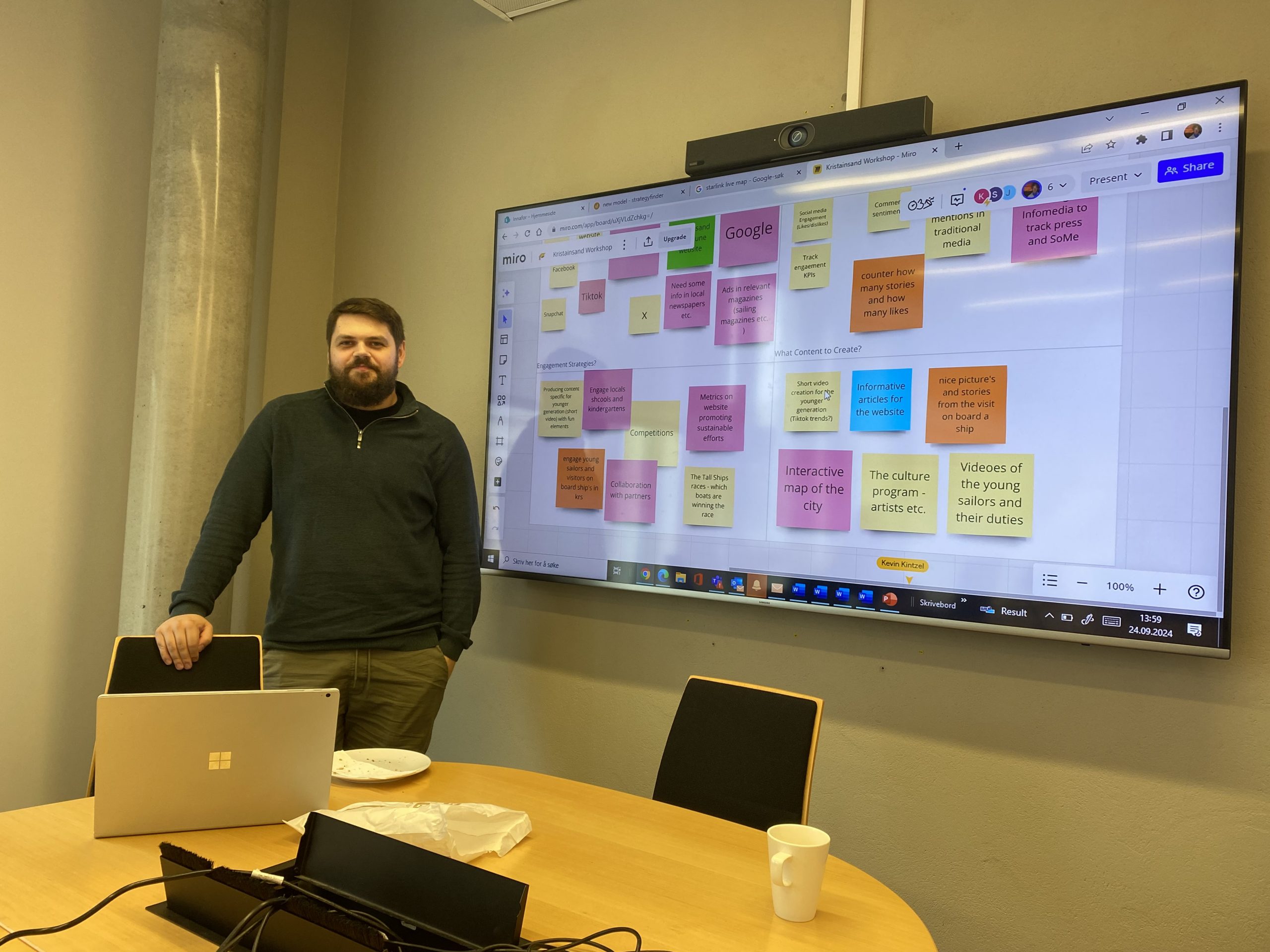

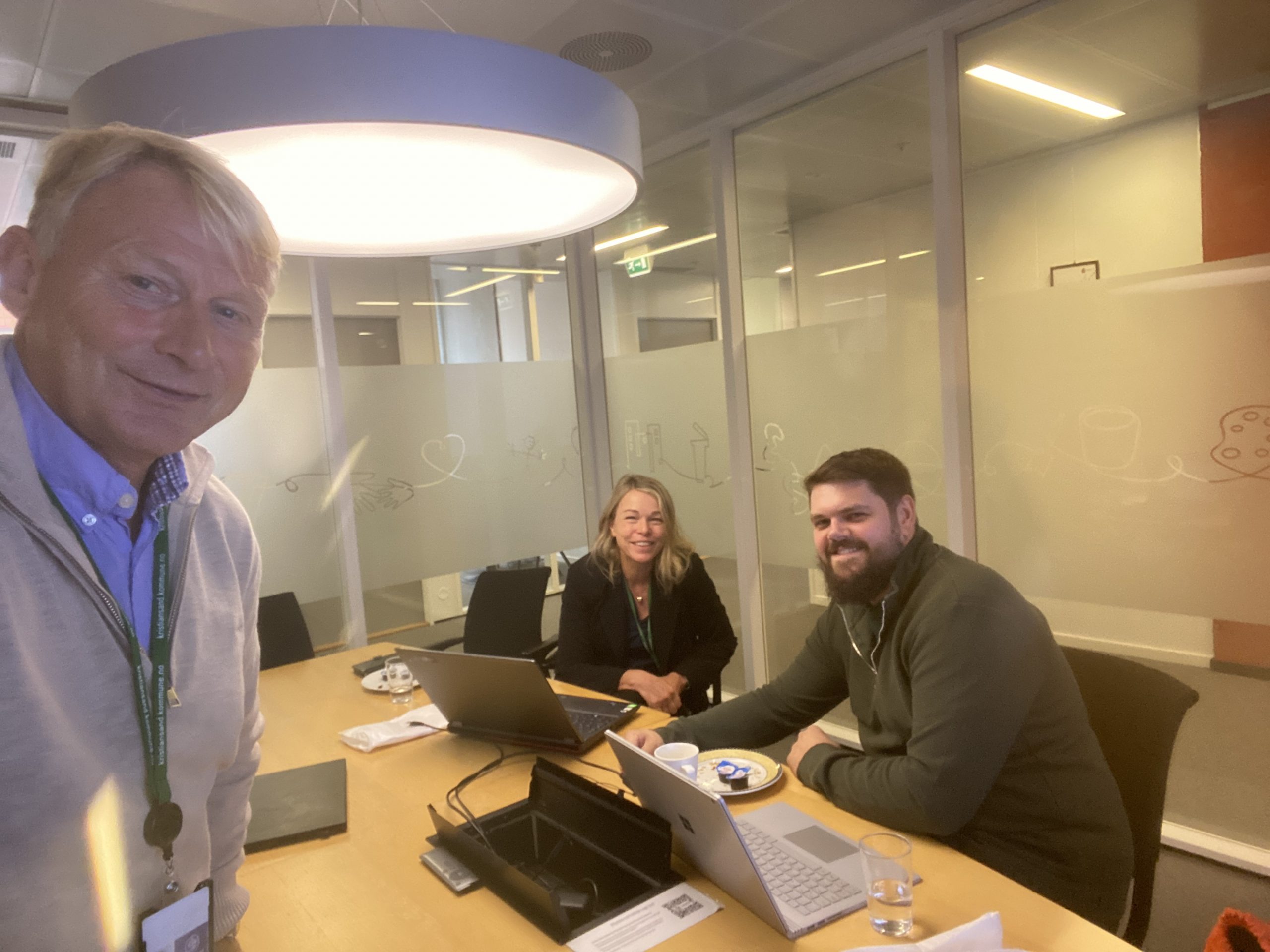
Secondment report #13
Research Visit to Kristiansand Kommune, Norway
Between September 9 and October 9, 2024, I had the opportunity to visit the Kristiansand Kommune in Norway, where I conducted a workshop titled “Sustainable Communication Strategies for Community Events.” This visit allowed me to work with local stakeholders to develop strategies for promoting sustainability during community events, with a special focus on the upcoming Tall Ships Races 2025. The workshop provided an excellent opportunity for collaboration with the Kristiansand Kommune to develop sustainability communication strategies aimed at fostering a resilient community.
Objectives and Activities
The main objective of the workshop was to outline the importance of sustainability communication for community events. We began by exploring how local businesses, residents, and other stakeholders could leverage social media to
communicate about sustainability initiatives effectively. A key aspect of the discussions focused on the role of social media analytics in measuring the impact of these communications, allowing stakeholders to better understand public
engagement and optimize their messaging for broader reach and effectiveness.
The workshop also emphasized the transfer of knowledge from universities to local communities, highlighting how academic research can support real-world initiatives. By applying insights from university-led research on sustainability and communication strategies, we aimed to equip participants with cutting-edge approaches to promoting environmental consciousness during large-scale events like the Tall Ships Races. This knowledge transfer is critical in ensuring that communication strategies are not only innovative but also grounded in proven methodologies.
Throughout the workshop, participants engaged in discussions about stakeholder engagement, the use of social media as a communication tool, and the importance of transparent, authentic messaging to avoid "greenwashing." We focused on using a collaborative approach to identify relevant stakeholders, including local businesses, residents, policymakers, and influencers, and tailored communication strategies to align with their interests. The integration of data-driven insights from social media analytics further helped participants understand how to refine their messaging for maximum impact.
Outcomes and Future Directions
The workshop in Kristiansand Kommune provided a valuable platform for developing practical communication strategies for the Tall Ships Races 2025. This collaboration also sparked conversations about the long-term impact of sustainable
practices in Kristiansand and how the Kommune can use this event as a model for future eco-friendly events.
The use of social media analytics in particular emerged as a powerful tool to monitor and adapt communication strategies, ensuring that sustainability messages resonate with diverse audiences. Additionally, the workshop underscored the value of continuous knowledge transfer between universities and local communities. By leveraging academic research, Kristiansand Kommune can continue to innovate and refine its sustainability communication efforts, setting a precedent for future collaborations between educational institutions and local governments.
Reflections
My visit to Kristiansand Kommune was a rewarding experience, not only for the knowledge exchange but also for the opportunity to engage deeply with the local community. The workshop highlighted the importance of grassroots collaboration
in promoting sustainability, especially in preparation for large events like the Tall Ships Races. The integration of social media analytics provided valuable insights into audience engagement, while the transfer of academic knowledge
added depth to our strategies.
This visit has reaffirmed my commitment to understanding how local communities can work together to communicate sustainability effectively, particularly in the context of significant public events. The insights gained from this visit will inform future projects and contribute significantly to advancing sustainable communication practices.
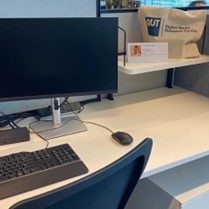
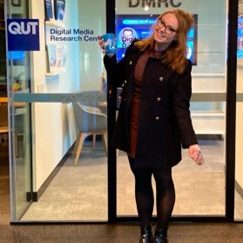
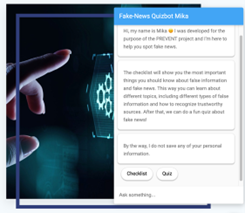
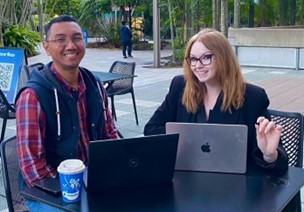
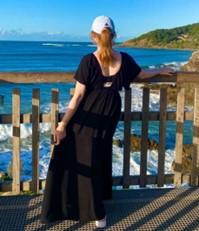

Secondment report #12
The University of Potsdam visits the Queensland University of Technology
It is in the middle of July, 2024, it’s 24 degrees Celsius outside, it’s the Australian winter. G’day! I am thrilled to kick off my research journey in Brisbane, Australia, at the Queensland University of Technology (QUT). As soon as I arrive, I see that even a workspace is set up for the next month and a half, including a printed name tag. I feel so welcomed from the start – and then I see the team at the Digital Media Research Centre (DMRC) for the first time, eagerly waiting for me to introduce myself in my first team meeting.
Ready to network with globally recognized researchers from the Department of Communication, I enthusiastically introduce myself: “Hi, my name is Viva. I’m a relatively new PhD candidate at the University of Potsdam, specializing in Business Information Systems and Digital Transformation. I am excited to engage in discussions about the impact of crisis communication on social media and explore tools designed to mitigate negative consequences. My research particularly focuses on emotional responses during online interactions to explore cognitive components in human-computer interaction.”
In the past, the RISE_SMA secondments have led to the development of innovative tools, methods, and frameworks that aim to analyze crisis communication within the digital landscape of social media. Inspired by these, I introduced the quiz bot from our department that is set up for identifying fake news during crises and put it to a test with SMA experts at QUT. The evaluation resolves around two main objectives:
1) Valuable Feedback: How can we optimize our quiz bot, designed for a younger audience, to more effectively combat online disinformation campaigns?
2) Cognitive Responses: Are there noticeable emotional reactions of participants during the testing that we can use for further collaborations?
initiated an intensive, experimental feedback session with eight participants. All participants are holding either a Master’s degree or a PhD within the field of communication and got their degrees from different countries (Indonesia,
India, Australia, Switzerland, Brazil, Denmark). The experiment included a first round of quizzing, a second round of using the checklist for educational purposes and another round of quizzing.
he results were mainly as anticipated, especially given the expertise of the participants. However, some findings were surprising. Initially, during the first quiz session, participants focused primarily on the design and presentation
of fake news alongside their own knowledge base for identification. They were focusing on giving feedback, such as updating the design, the handling and the language. However, following the educational session their decision-making
processes shifted significantly towards using a third party to double check their first impression. That indicates: While they relied on personal judgment in the first round, seven out of eight participants utilized suggested identification
tools during the second quiz session (e.g., verifying news articles based on educational content). This shift provides valuable insights into how different target groups navigate fake news during crises and inspires to dig further
into this subject.
owever, my secondment didn’t just revolve around this one single project. In Australia, I have had the privilege to explore meaningful connections with international experts to exchange information and research insights. The DMRC team
has been exceptionally inclusive and supportive - they welcomed me not just as a visiting fellow at their research institution but also invited me to participate in trivia nights, barbecues, and various excursions across Australia
to be part of the local culture for a little while. We laughed, debated, and learned together, creating an environment that fosters both academic collaborations and personal connections.
dditionally, I had the opportunity to explore the beautiful, vibrant, inspiring country that is called Australia. First and foremost: Byron Bay. I spent a weekend here to relax and explore the beaches and the surrounding nature with
the fantastic people from DMRC. From going to the bohemian markets or swimming in the crystal-clear waters of Byron Bay to hiking up to the lighthouse for the sunrise - the experiences created an inexpressible connection with the
Australian landscape and its people. Also, another location that I went to and will be unforgettable: Palm Cove and the famous Great Barrier Reef. Snorkeling through the famous corals of the sea was genuinely one of the best experiences
in my entire life and I will be forever grateful that I was able to see this with my own eyes.
n summary, this RISE_SMA secondment has not only enriched academic collaboration between the DMRC and my home department at the University of Potsdam but has also created a connection between our two participating countries. The memories I can look back to (whether it was research, participating in social settings or exploring the natural beauty of Australia) will forever have a special place in my (academic) heart and shaped my PhD journey from the start. In the future, we will be able to use the results of the quiz bot testing to collab on a paper together to explore the individual, emotional challenges of human-computer interaction during crises.
Thank you for the opportunity, RISE_SMA!
And goodbye for now, Australia! I’m sure we will see each other again.
Secondment report #11
My Research Stay in Brazil: Insights and Experiences
As part of the RISE_SMA project, I, along with Prof. Stieglitz, have had the wonderful opportunity to be guest researchers at UNISINOS in Porto Alegre and UNIP in São Paulo January 2024. This visit has been an incredibly enriching experience both academically and culturally. The RISE_SMA project, funded under the EU Marie Skłodowska-Curie Research and Innovation Staff Exchange, aims to foster international collaboration and enhance research on social media analytics in societal crises. Our secondment at UNISINOS and UNIP is part of this initiative. The project’s goal is to develop a modular prototype for analyzing societal crisis situations using social media data.
UNISINOS – Porto Alegre
My journey in Brazil began with a stay at UNISINOS in Porto Alegre, where I had the pleasure of meeting Prof. Gustavo Fischer and Rafaela Tabasnik who is a former student at the UNISINOS and now working for SAP in online communications. During my stay, I gave a guest lecture on the topic "Designing Virtual Agents for Organizational Social Media Communication." This lecture, particularly the one in Gustavo Fischer's Design Masterclass, sparked engaging discussions on automation and the role of bots in social media crisis communication, showcasing the interdisciplinary nature of this research area.
My academic journey was complemented by an insightful visit to the South American headquarters of SAP at SAP Labs Latin America in Porto Alegre. I had an inspiring conversation with Nickolas Werckmeister, the Head of Technology & Transformation. The discussion underscored the importance of technological advancements and their societal impacts, aligning perfectly with the goals of the RISE_SMA project.
During my stay in Porto Alegre, I also had the opportunity to experience the vibrant Brazilian culture firsthand. I attended a rehearsal for the Brazilian Carnival, which was an unforgettable experience. The lively music, colorful costumes, and infectious energy of the performers provided a deep cultural insight that enriched my understanding of Brazil.
UNIP – Sao Paulo
After ten days in Porto Alegre, I moved to São Paulo for another two weeks, where we visited Adriana Amaral and Beatriz Blanco at UNIP. Here, we discussed future projects and potential collaborations. This meeting, held with my professor Stefan Stieglitz from the University of Potsdam and Christoph Fuchß from Virtimo AG in Berlin (another project partner), was highly productive. We explored new research opportunities and planned upcoming joint initiatives, further solidifying our international research network. The networking opportunities provided by this secondment have been invaluable. Interacting with experts like Gustavo Fischer at UNISINOS and our hosts at UNIP has opened up new avenues for collaboration. The feedback and suggestions from these interactions will help us improve our research methodologies and theoretical frameworks.
Apart from academic and professional growth, this trip has been a cultural delight. Experiencing the vibrant culture of Brazil, from its warm hospitality to its rich traditions, has been a highlight of my visit. These experiences have enriched my understanding of the local context, which is crucial for our research on social media communication in crises. Besides that, I also had the opportunity to travel to the Iguacu waterfalls during one of the weekends which was an incredible nature experience that I will never forget.
As I wrap up this fruitful visit, I look forward to implementing the insights gained and continuing our collaboration with our Brazilian counterparts. The knowledge and experiences garnered here will undoubtedly contribute to the success of the RISE_SMA project and our future research endeavors.

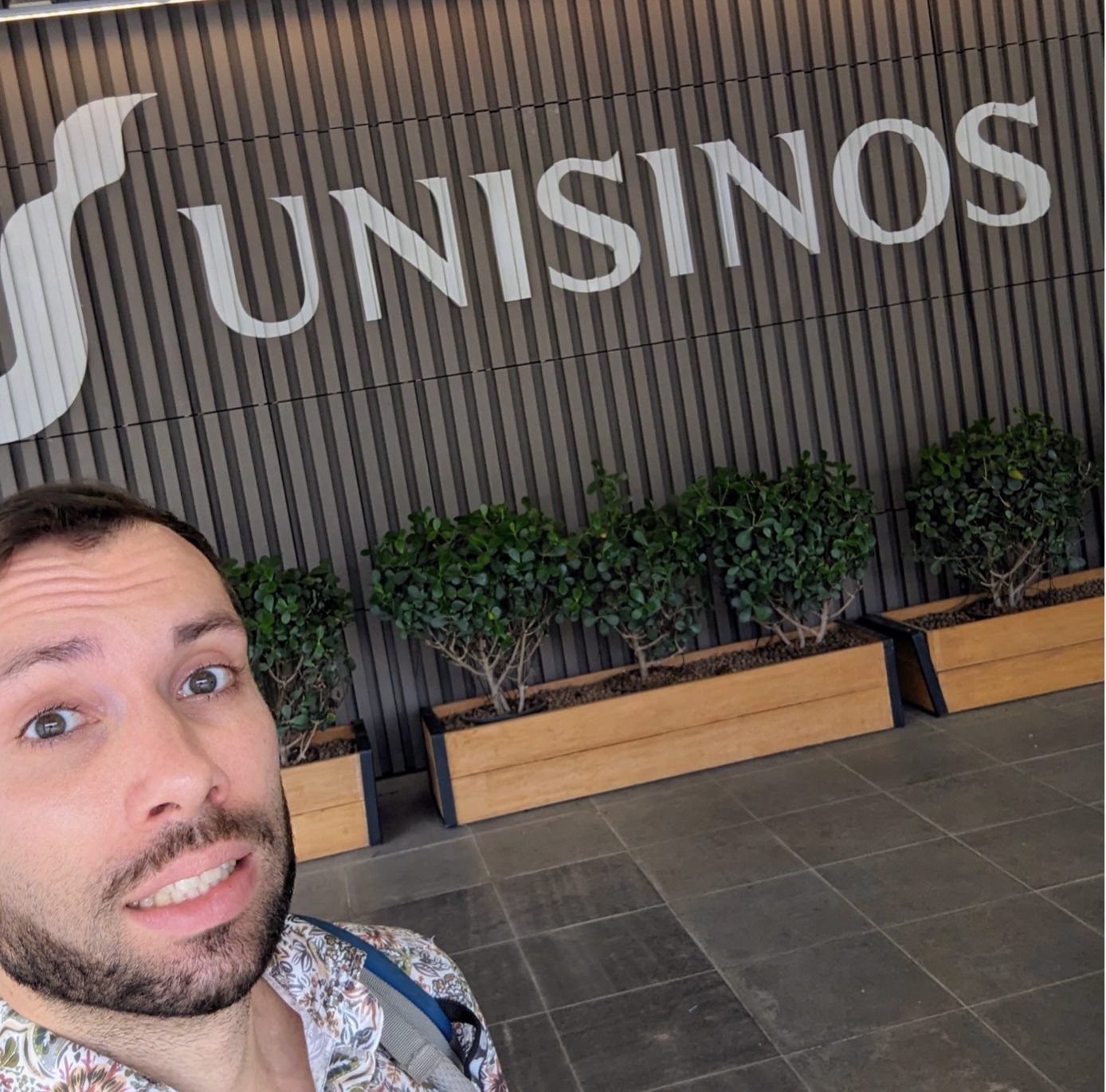
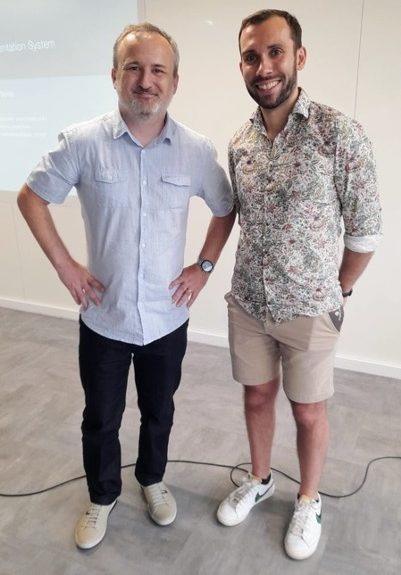
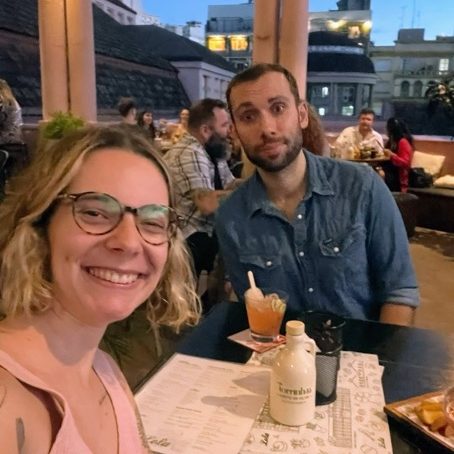
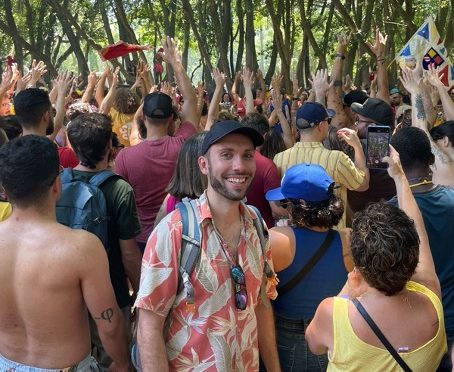
Secondment report #10
Research Visit to Brazil
Between February 12 and April 1, 2024, I visited the University of SINOS in Porto Alegre and UNIP in São Paulo, Brazil, for a research exchange focused on Fake News, Narratives, and Crisis Communication. This visit allowed me to collaborate with Professor Adriana Amaral, a specialist in Communication Science. The stay was extended from May 31 to 22 June, 2024 and an additional visit by Professor Adriana Amaral to the University of Potsdam was taken.
Objectives and Activities
Our primary activities included in-depth discussions on the challenges and dynamics of fake news and crisis communication. We organized methodological workshops, aiming to explore and understand social media’s role in these areas. These provided a platform for exchanging ideas and methods, crucial for developing innovative research projects in the future.
Outcomes and Future Directions
The visit was instrumental in building a foundation for ongoing and future collaborations with Professor Amaral and other researchers from UNISINOS and UNIP. We identified several areas for future research, particularly focusing on the impact of social media.
Reflections
The trip was a valuable opportunity to engage with leading academics in my field, enhancing my understanding and approach to research. The insights gained and the connections made promise to enrich future projects and contribute significantly to our understanding of digital communication challenges.
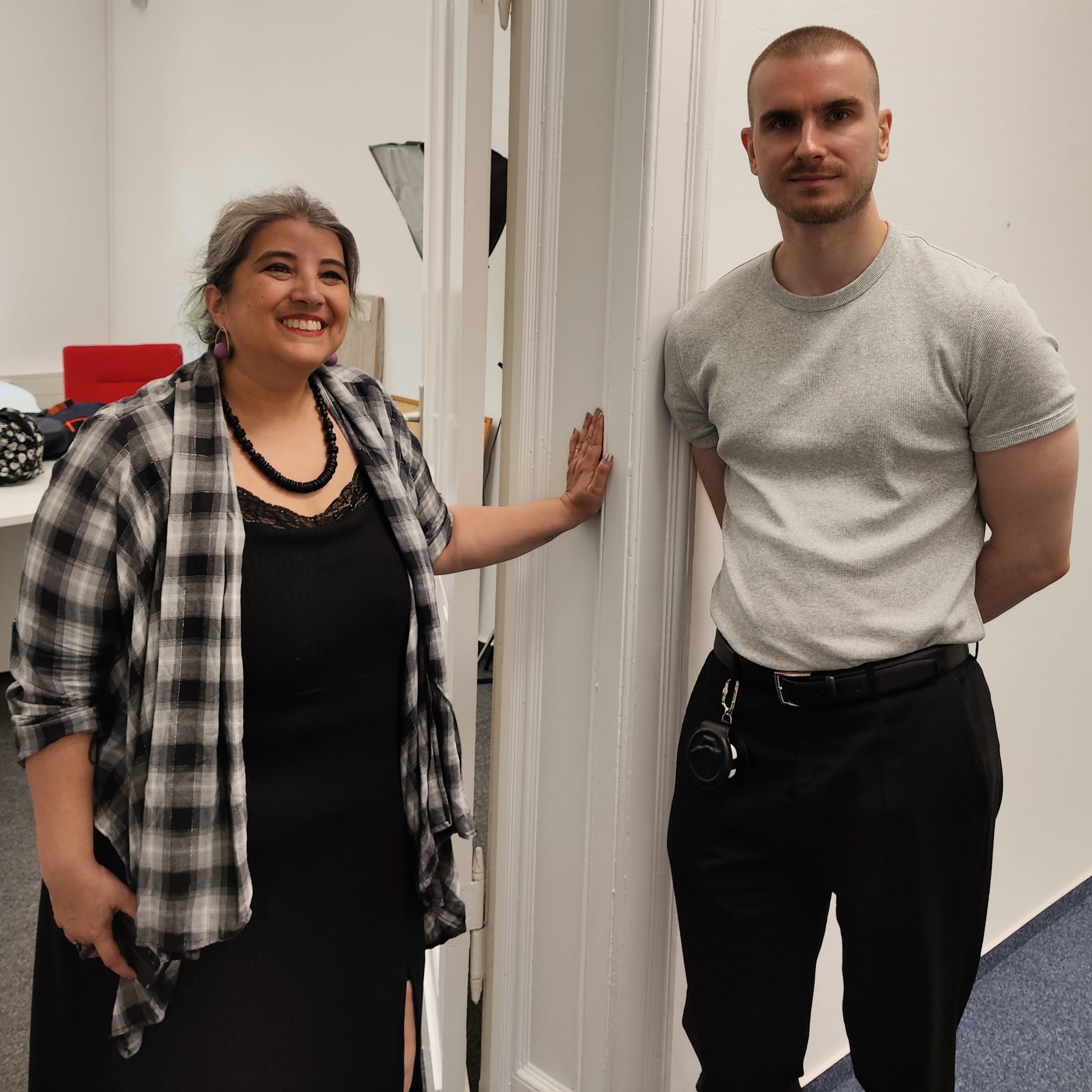
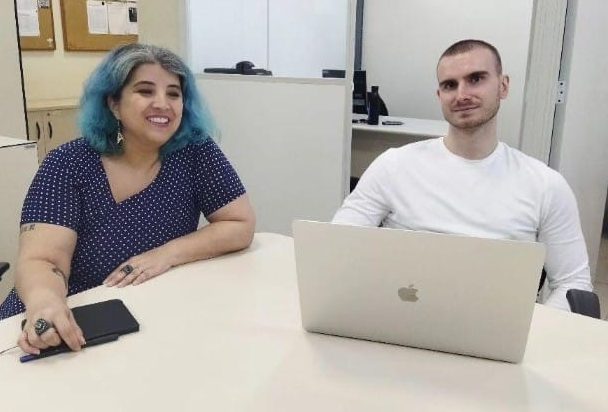
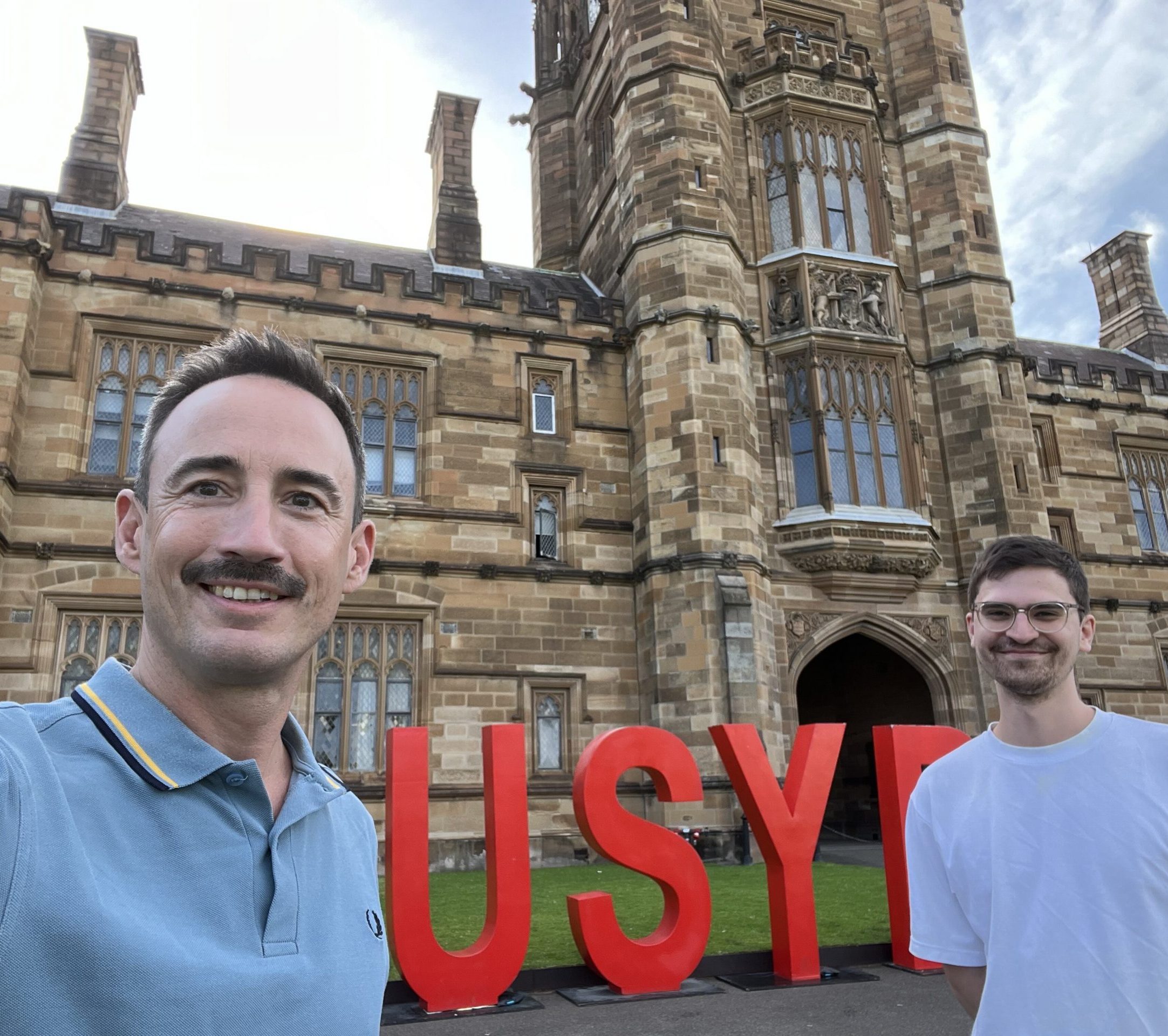
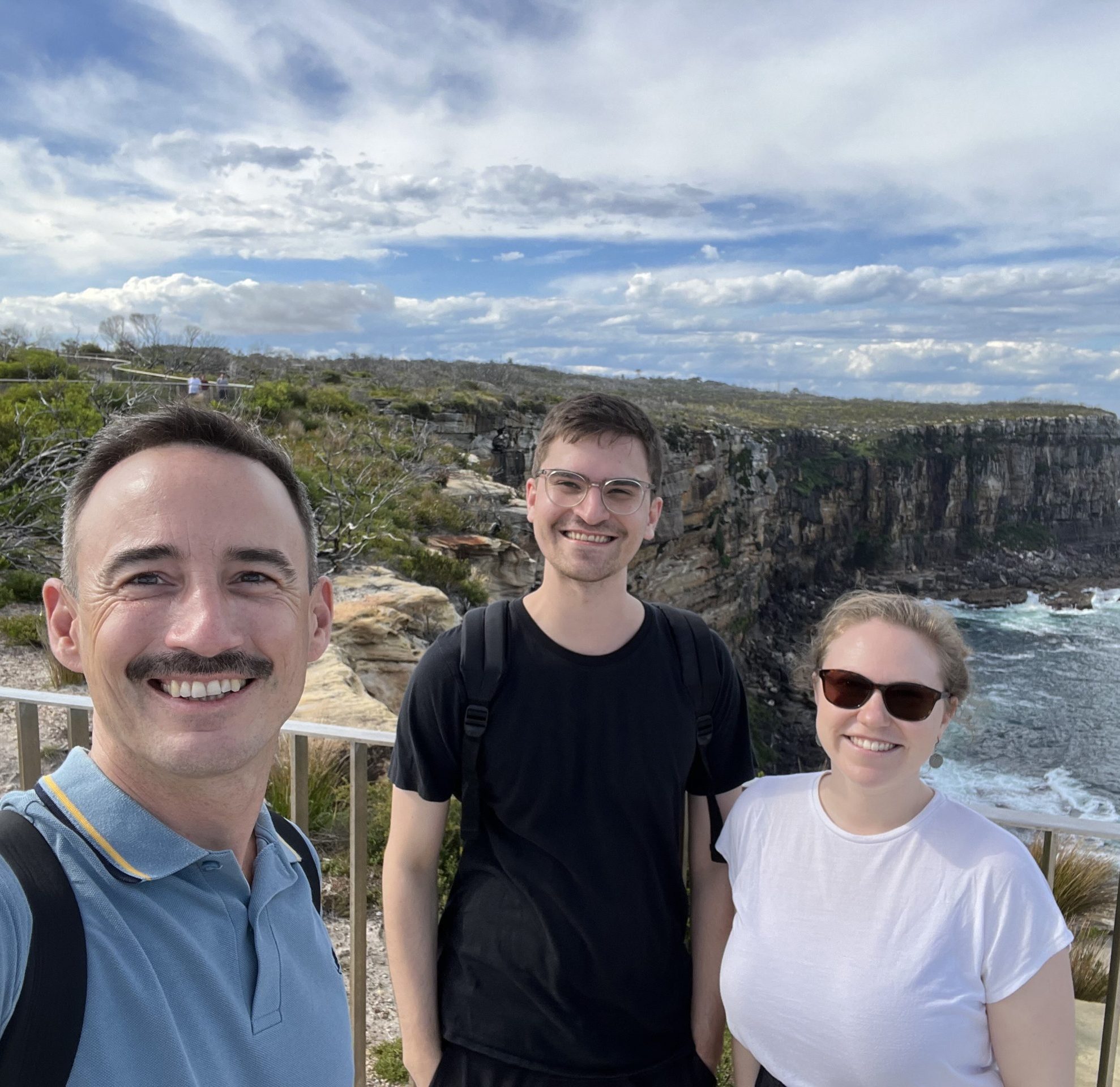
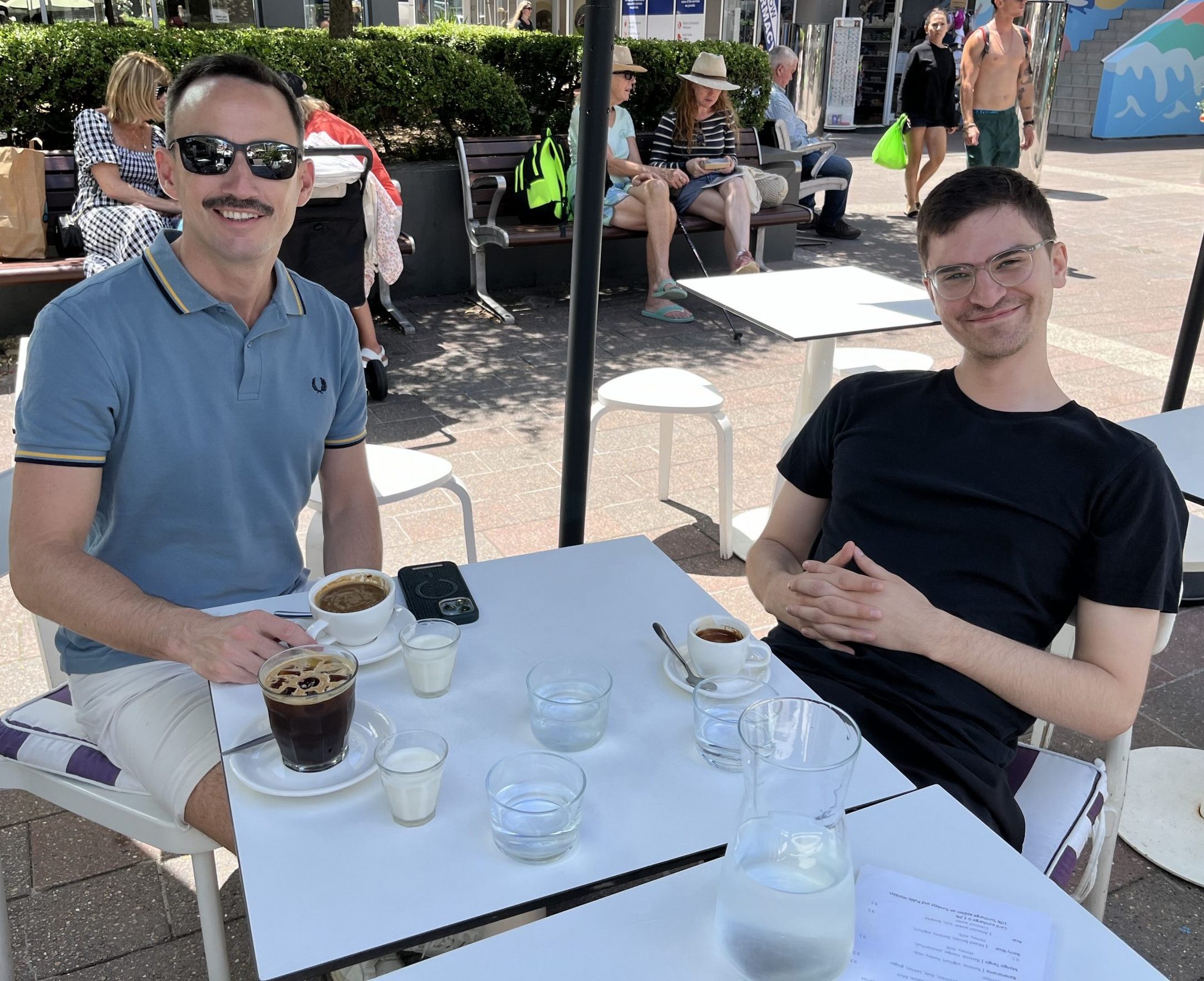
Secondment report #9
Research Visit in Sydney
Between 20/11/2023 and 25/01/2023 Prof. Dr. Stefan Stieglitz, chair of information systems and digital transformation at the University of Potsdam, and Kai Schewina, research assistant at the chair, had the opportunity to visit the University of Sydney Business School. Due to the COVID-19 pandemic the exchanges were not possible in the past years, which is why we were grateful to be able to visit our colleagues Prof. Dr. Carol Hsu and Prof. Dr. Deborah Bunker. Carol Hsu is the Head of Discipline in Business Information Systems (BIS) at the University of Sydney and researches digital strategy and information security management. Deborah Bunker is professor emeritus and her works focus specifically on social media in crises. Further, we were joined by Christoph Fuchß, CEO of the Virtimo AG, leading to three RISE_SMA participating organizations meeting in Sydney.
We were able to present our current research on social media analytics, crisis communication and the impact of social media on society as part of a joint workshop by the University of Potsdam and the University of Sydney Business School. Specifically, we discussed the impact of disinformation in the current political climate and its relation to crises. In addition to these discussions, we explored potential future collaborations on crisis communication research. We identified several promising areas for joint research, including the development of new methodologies for analyzing social media data during crises and the creation of frameworks for more effective crisis communication strategies. Specifically, we discussed further development of the chatbot created as part of the project to allow for a thorough investigation of its effectiveness in addressing awareness for disinformation, that is going to be carried out in a future publication. As the pandemic created a gap in our regular exchanges, the visit was crucial to reestablish our collaboration.
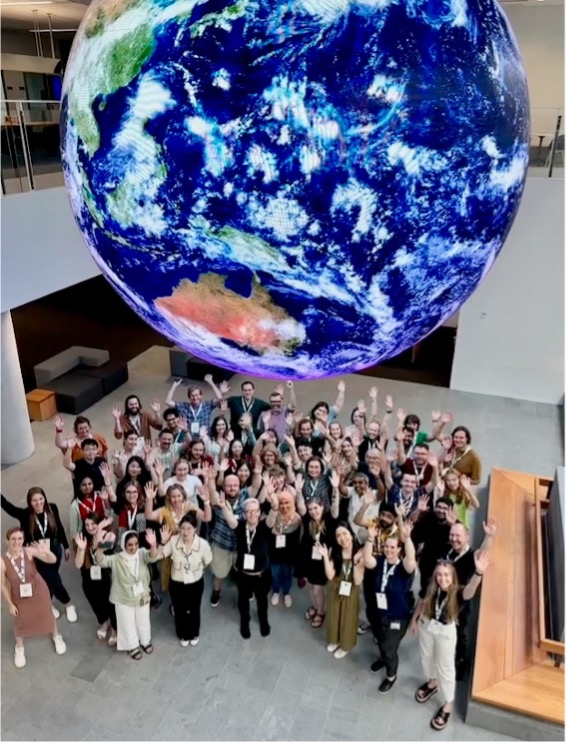
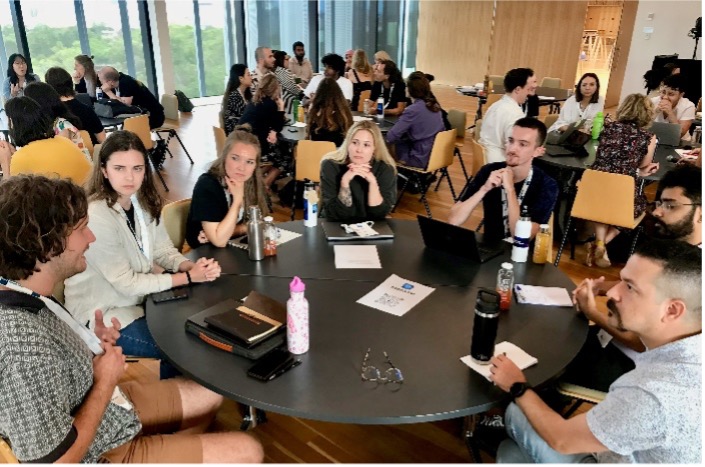
Secondment report #8
Visiting the DMRC at QUT in Brisbane – Research visit and summer school participation
The Digital Media Research Centre at the University of Queensland in Brisbane, Australia, is part of the RISE RSMA program and is represented by Professor Axel Bruns. As a visiting PhD student hosted by Professor Daniel Angus, leader of the Computational Social Sciences program at the DMRC, I was also invited to the DMRC Summer School 2023, which was held at the QUT Kelvin Grove Campus. As it was the first Summer School, after a long period of pandemic restrictions, everyone was very much looking forward to meeting in person again. The event took place in the third week of my visit to Brisbane and was a great opportunity to get to know young and experienced researchers from the DMRC, other universities in Brisbane and Australia, and international visitors from around the world.
With a mixture of networking activities, lectures, presentations and hands-on workshops, the program provided a comprehensive overview of the type of research my hosting institution, the DMRC, is involved in. I learned about a range of digital tools and projects, which also helped me to develop a new idea for a collaborative research project. I felt more than honored to have the opportunity to present one of my own studies in a hybrid format during the Summer School, which helped me improve my work through positive, inspiring feedback. Another highlight was the keynote address by Professor Chelsea Watego, Professor of Indigenous Health at the QUT School of Public Health and Social Work at QUT Carumba Institute, and Amy McQuire, who is a freelance writer and journalist, currently writing a PhD thesis on the portrayal of violence against Indigenous women in the media. Both draw attention to the role of race in creating inequalities, whether in health or gender. The opportunity to learn about their work in research and media, telling Aboriginal stories and highlighting the injustices and inequalities in Australian society was a unique and unforgettable experience.
With all these impressions in mind, I was more than motivated to start my own research project on the Australian federal election campaign in social media as a contribution to my dissertation project. Together with Daniel Angus and his colleagues, I was able to find a research question which will be answered by applying a topic modelling approach using social media content. Thus, my collaboration with the DMRC will continue even after I return to Duisburg and hopefully be concluded with a contribution to the state of the current knowledge.
Secondment report #7
RISE_SMA from a practitioner perspective
In November/December of this year I was privileged to get insights to the RISE_SMA project from a practitioner perspective. Therefore, I attended various meetings in Sydney (University of New South Wales, Business School) as well as in Perth (as part of ACIS, the Australasian Conference of Information Systems).
On the 26th of November I was allowed to kick of a week about discussions on social media impacts for crisis communication by talking about User Adoption and Change Management in the Digital Age. We had a great discussion with attendees from the Sydney Business School (Australia), the University of Duisburg-Essen (Germany) as well as from the Kristiansand municipality (Norway).
On the 29th of November I participated at workshop on Disaster Management and Volunteering in the Digital Age. Given the current situation around the bushfires on the east coast of Australia, we discussed with researchers (e.g. University of New South Wales, University of Wollongong, Macquarie Uni, University of Duisburg-Essen) and practitioners (e.g. New South Wales Emergency, New South Wales Government, New England Population Health) about current practice of crisis management and derived further research areas.
During the ACIS I was asked to be one of the experts to talk about Ethical Guidelines for Social Media Analytics. Together with Professor Deborah Bunker (Panel Chair, University of Sydney), Professor Caroline Chan (RMIT), Dr. Christian Ehnis (University of Sydney) and Dr. Sojen Pradhan (UTS) as well as with the audience we debated about what approach Social Media Analytics should take in order to not violate human rights and ethical guidelines.
I learned a lot about the current situation and which areas need to be improved. In conclusion, I am convinced that the research, which is carried out within the RISE_SMA project, will have a significant impact on us when using Social Media Analytics for society and crisis communication. I highly recommend interested practitioners to get connected and participate at offered events.
Bio: Nicholas Frick is Manager of Communication & Collaboration within an internal IT Department at a large agricultural trade and service company in Germany. Before his current position, he worked as a Full Stack Developer as well as an Application Developer and was responsible for the data collection and preparation for eCommerce platforms. Afterwards, he switched to the management level, starting as a Head of Customer Relationship Management. His main tasks were the strategic development and integration of the system into the existing infrastructure as well as the appropriate preparation of data for making a targeted approach of customers. In his current position, he is responsible for maintaining and refining existing communication and collaboration systems followed by the introduction of new technologies to support employees working collaboratively. He is currently involved in the deployment of an enterprise social network and the migration of legacy systems to new, more innovative solutions.
Secondment report #6
Summer in Norway: Secondment Report on the Evaluation of a Media Literacy Chatbot with the Municipality of Kristiansand
In August 2022, I and my colleagues from University of Duisburg-Essen were in Norway for a one-month secondment with the municipality of Kristiansand. The goal of our stay was to evaluate a chatbot with the municipality of Kristiansand, which was developed to increase media literacy among the population in dealing with false information on social media.
The chatbot offers two main functionalities: 1) a checklist that provides the user with helpful information to detect false information on social media and 2) a quiz where users can test their ability to recognize false information based on real social media posts. The avatar has a gender-neutral appearance and changes their facial expressions based on the answers given by the user. Meanwhile, the chatbot also learned how to do some small talk. 😊
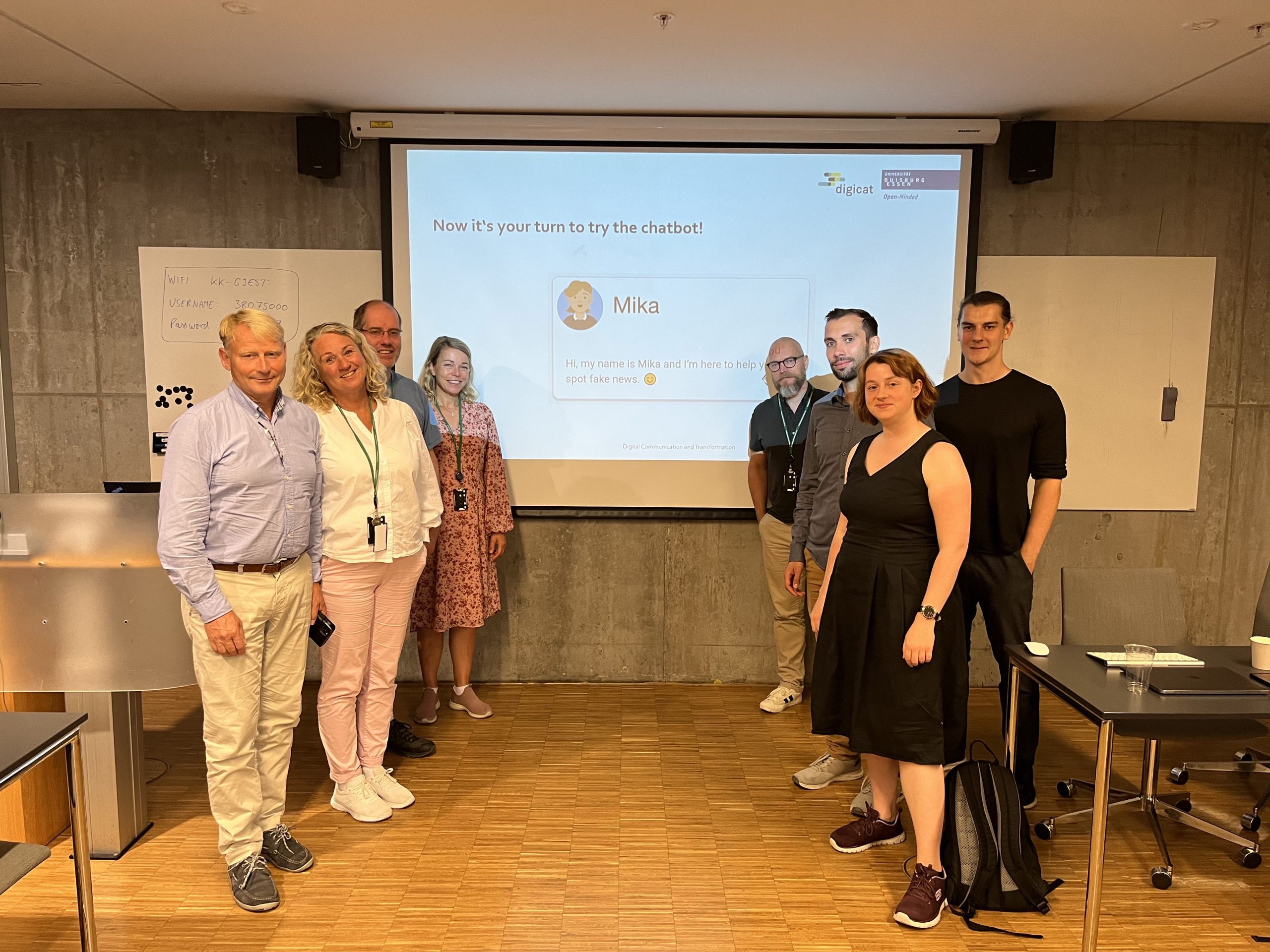
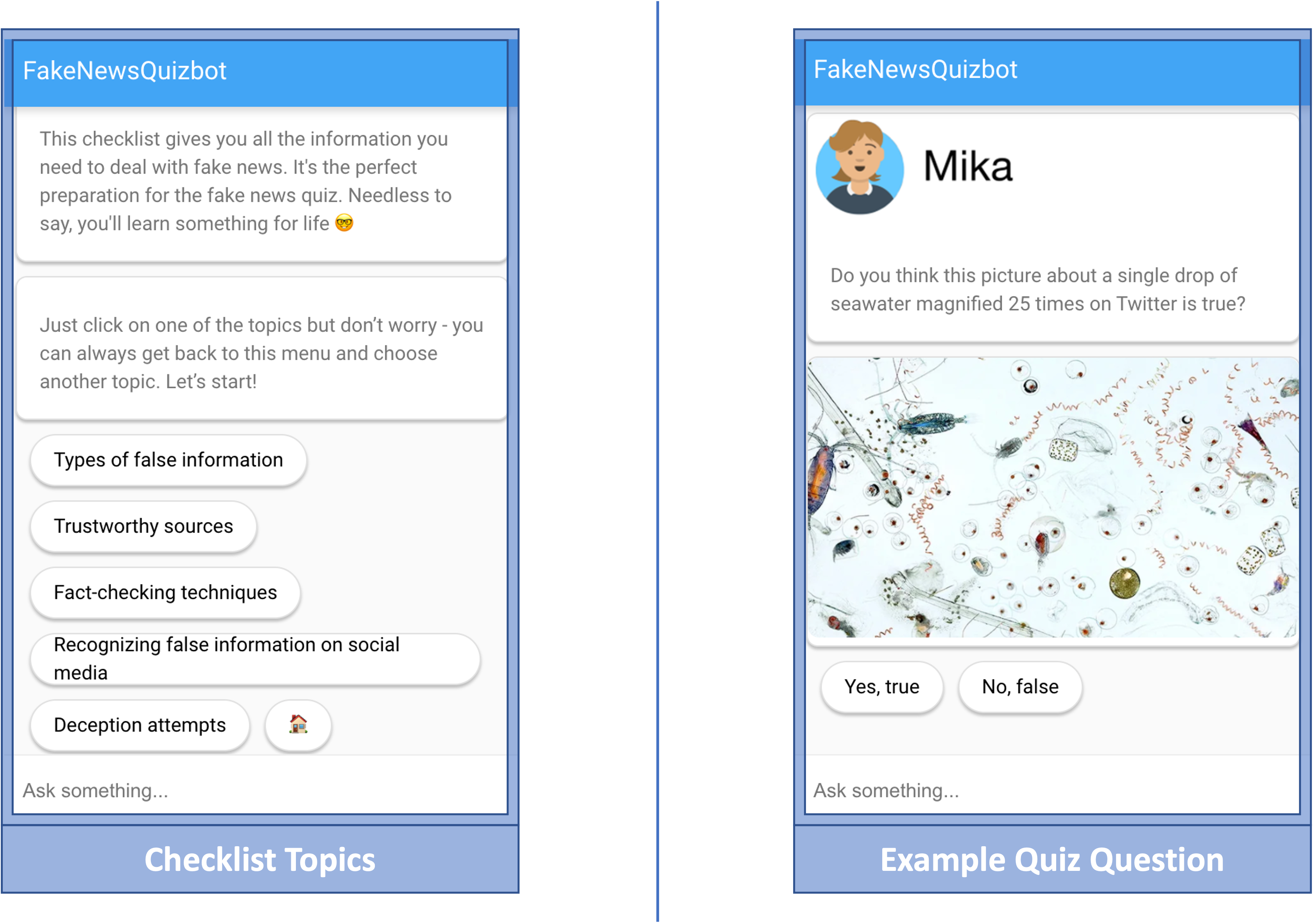
Evaluation workshop with the municipality of Kristiansand
During our stay, we conducted an evaluation workshop with communication advisors, IT experts, and crisis managers of the municipality. We learned that the municipality perceives it as their responsibility to provide the population with verified information on social media. However, they found the approach to educate citizens in media literacy and empowering them to critically assess information on social media highly interesting.
Overall, the chatbot was perceived positively, especially the gender-neutral avatar, humorous communication style, simple interaction, possible integration on multiple social media platforms, and the possibility to add and adapt questions
easily. The municipality suggested that the questions would need to be adapted for the local context and had some concerns about the resources needed to update the quiz questions regularly.
Meeting on the integration of the chatbot within the municipality
In another meeting with the municipality, we discussed the possibilities for integrating the chatbot into their existing communication channels. The municipality could imagine to extend the functionality of their existing chatbot Kommune-Kari
with a media literacy quiz. To implement the changes, they thought about contacting their chatbot service provider who could enhance the functionality of the chatbot in cooperation with the design department. The communication department
could be responsible for adding new questions from time to time.
Guest lecture at the University of Agder
Furthermore, we held a guest lecture in a master-level course at the University of Agder on the topic of false information & media literacy. During the lecture, the students also had the possibility to try the chatbot and we were
able to collect feedback from potential users. Overall, the students perceived the chatbot as a useful and fun tool to increase media literacy. They also described the interaction with the chatbot as appealing and pleasant. Thus,
we conclude that the chatbot could improve media literacy of citizens in a fun way.
Weekend hikes and swims
On weekends, of course, we also enjoyed the beautiful nature in Norway. One of the best experiences was our hike to Kjeragbolten and our weekend trip to Stavanger. And nothing beats the feeling of swimming in a clear mountain lake in summer. We had a great time in Norway and will be happy to come back!
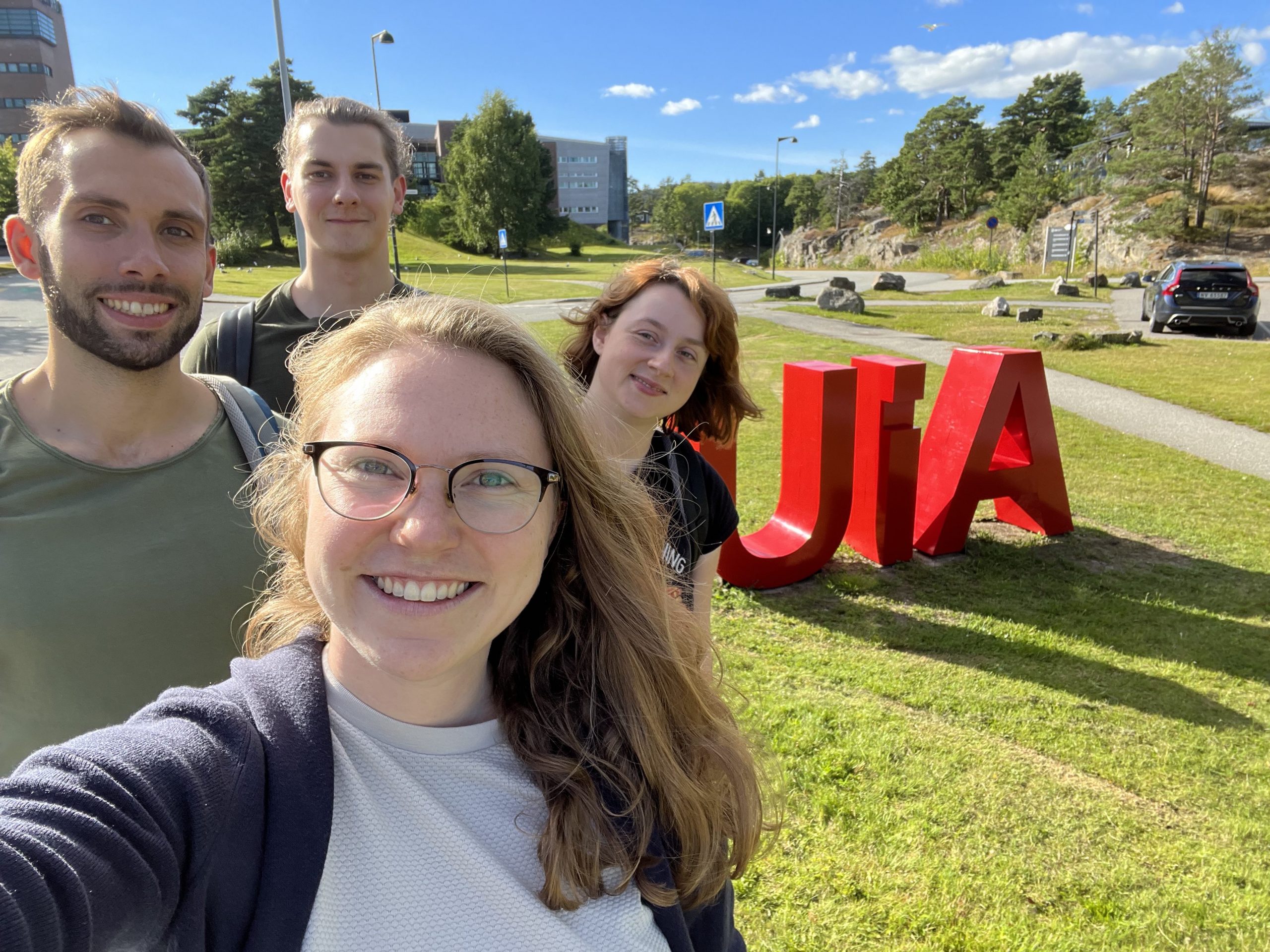
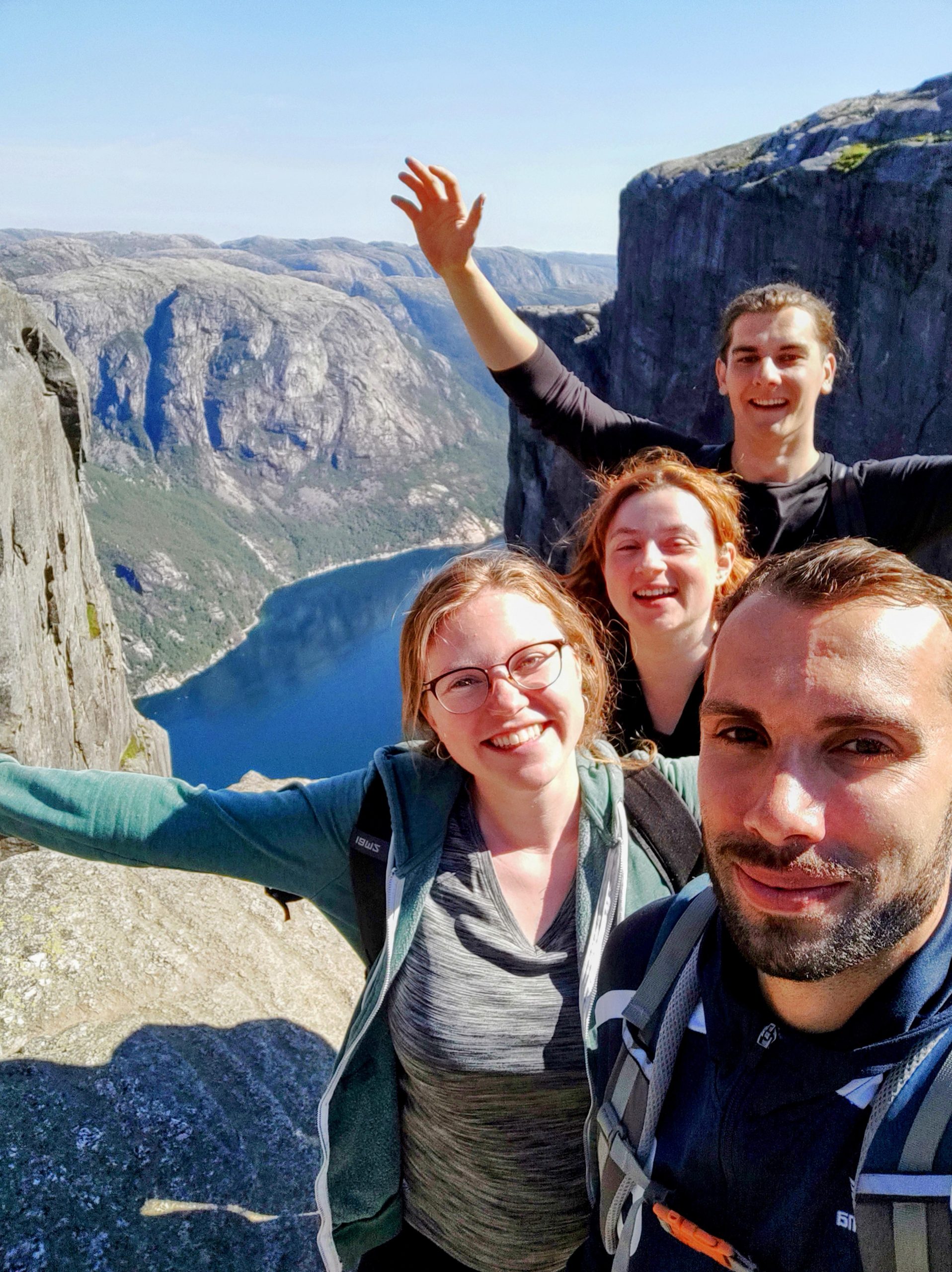
Secondment report #5
Sydney
From 30/01/2020 to 09/03/2020 I was one of the last who had the opportunity to travel to our research partner at the University of Sydney before the global corona pandemic. I visited Deborah Bunker, who is professor at the Business School for Business Information Systems (BIS).
As the main goal of my visit, I worked with Deborah Bunker and Christian Ehnis (Lecturer in BIS) on a paper investigating how chatbots can be used by emergency management agencies for crisis communication and response. The paper will directly contribute to one of the focus groups (Social Bots) of the RISE_SMA project.
As another reason for my visit, I worked on a taxonomy for digital volunteers together with a mixed group of researchers from Sydney, Duisburg and Kristiansand. In a workshop we tried to find out how digital volunteers can be defined in order to enable researchers and practitioners to better understand the phenomenon. The taxonomy which is currently work in progress will be a contribution to an equally important focus group of the RISE_SMA project (Digital Volunteers).
In addition, I was in constant exchange with researchers of the BIS discipline, who provided me with a lot of useful advice and suggestions for improvements on my ongoing research projects.
I also participated in the regular meetings of Deborah Bunkers Communications and Technology for Society Research Group, which deals with the use of technology for managing and understanding crises.
I would like to thank Deborah Bunker as a very great host. Besides the direct contributions to the RISE_SMA project, I was able to expand my social network and could learn a lot from Australian academia. I am already looking forward
to my next trip.
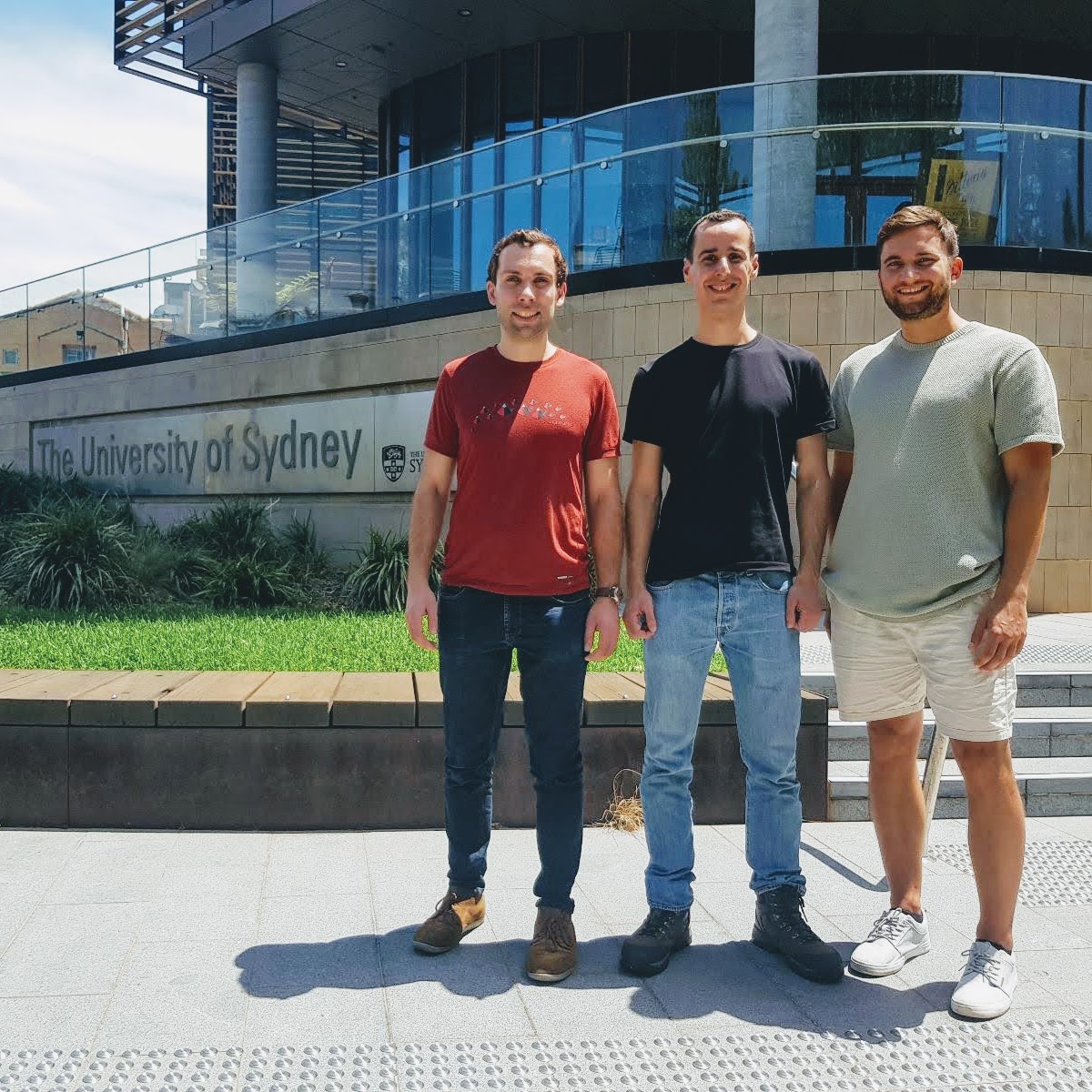
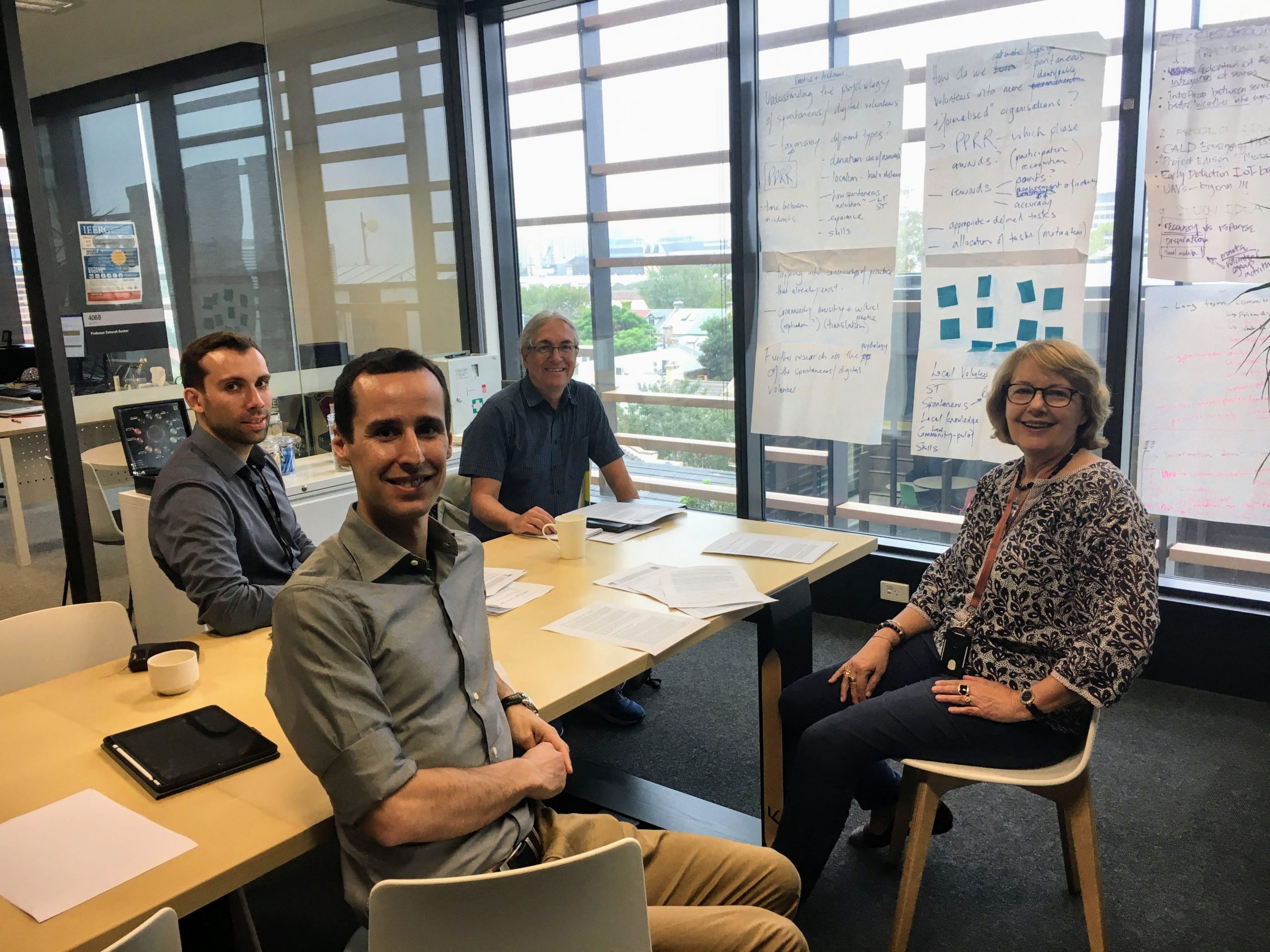
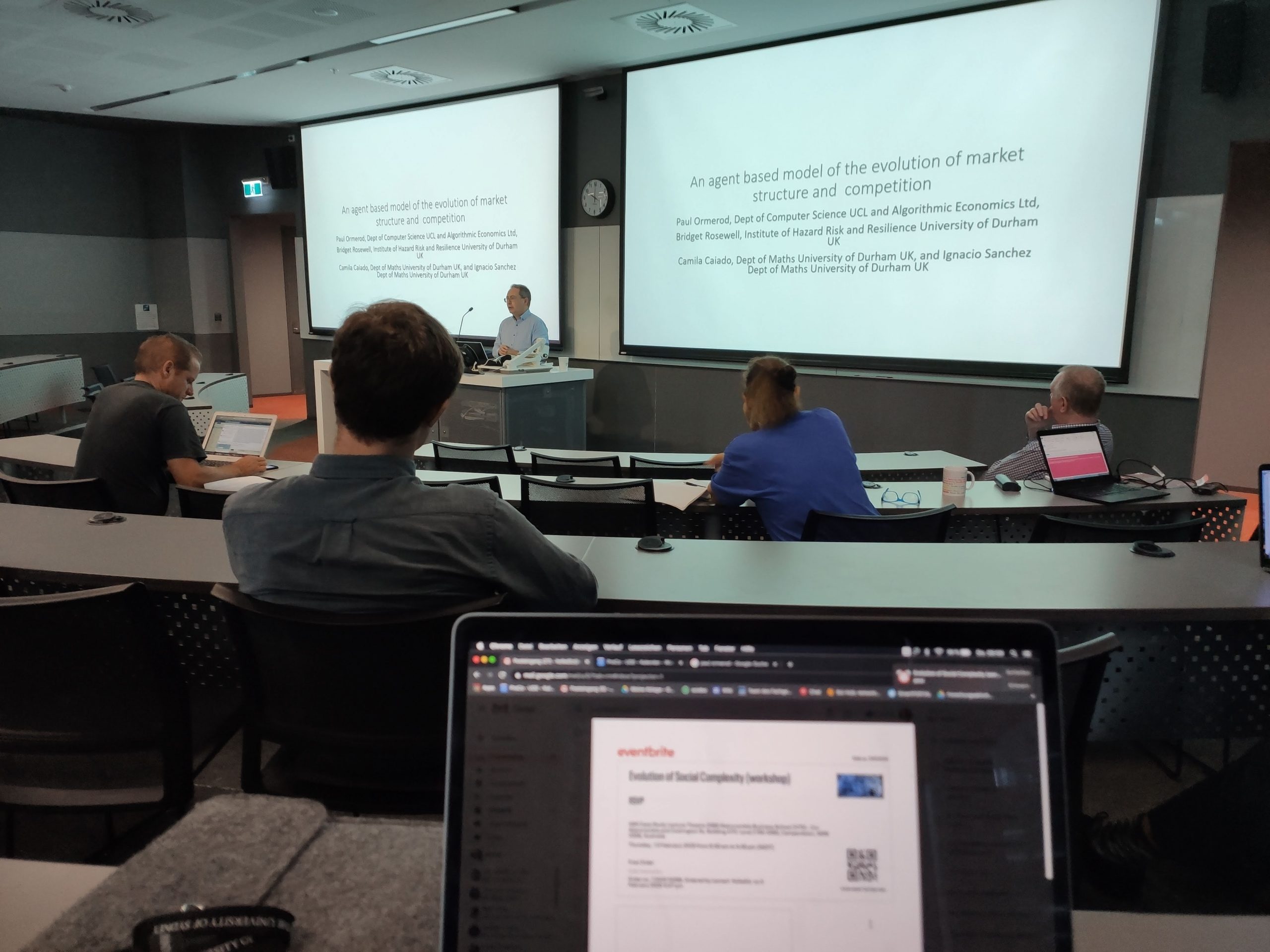
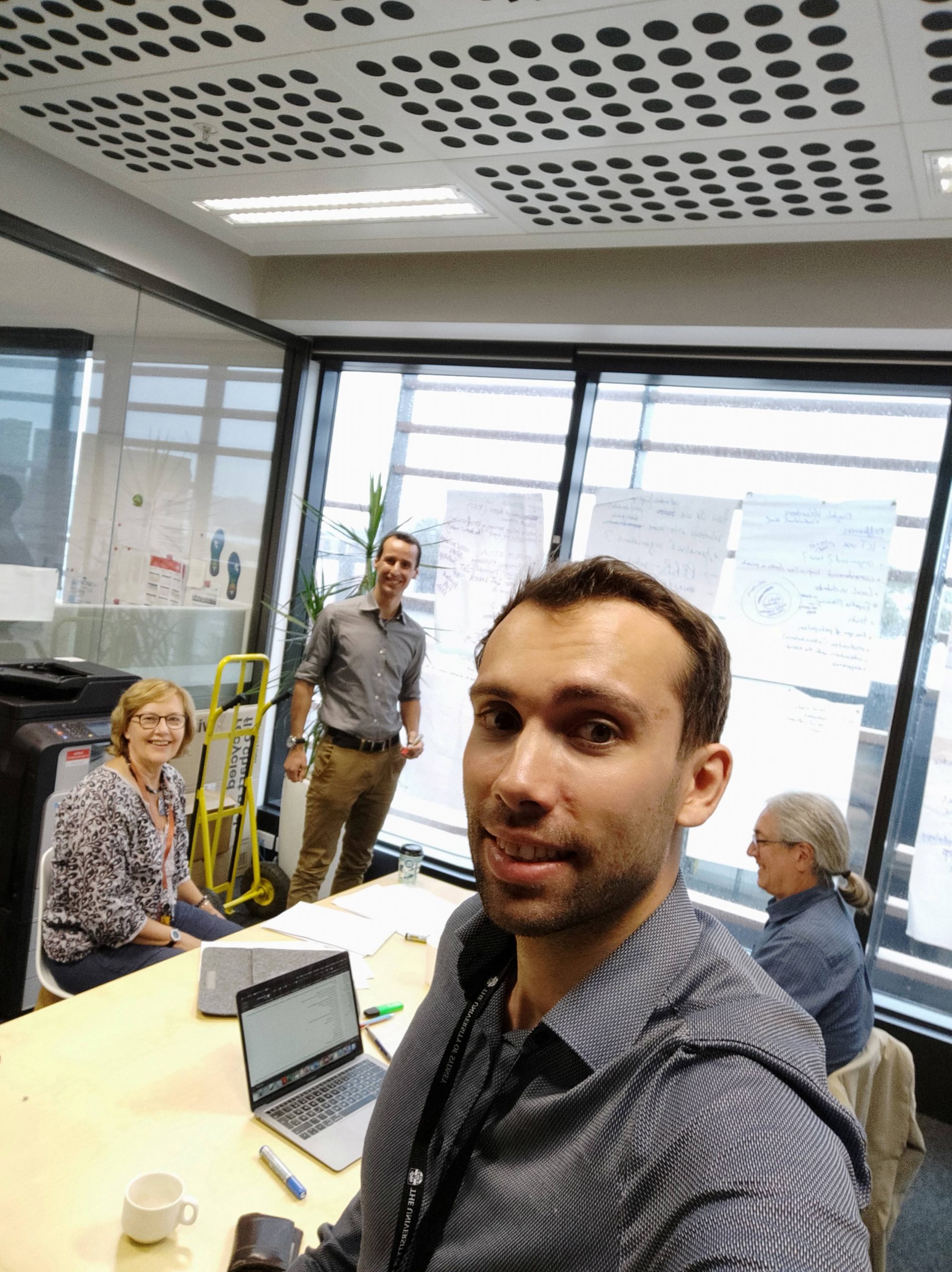
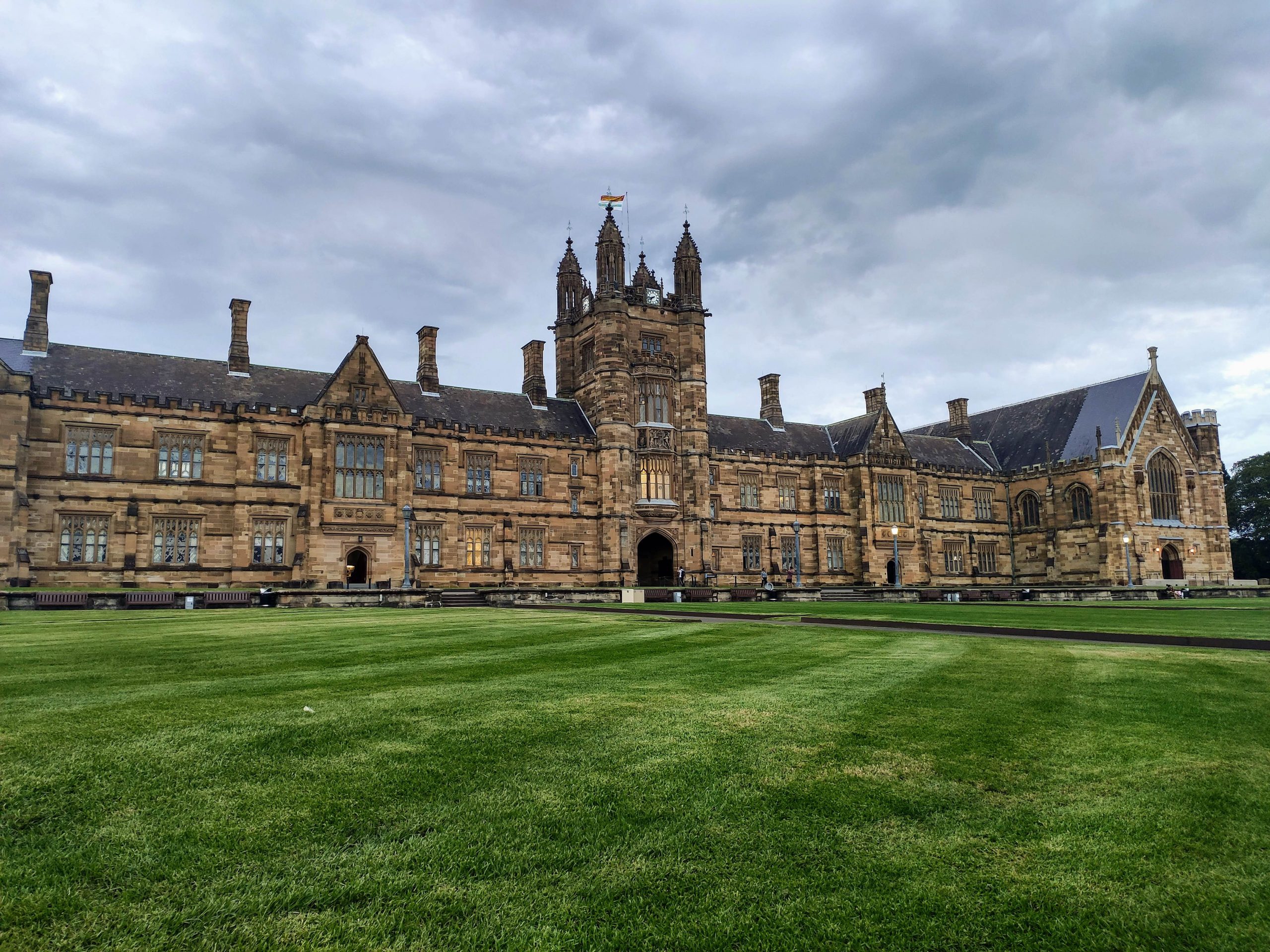
Secondment report #4
The benefits of the RISE project
One of the benefits of the RISE project is that, as a researcher you not only get to work with people from different countries (and in part cultures) but in addition with people from practice rather than research. These exchanges oftentimes offer insights into issues that may not necessarily be on a researchers agenda. On the other hand, it is probably also interesting for practitioners to get a more scientific view on topics. However, it may at times be also overwhelming to break out of the daily routine and to get and understanding of just how exactly certain disciplines in research work (i.e. what a working routine may look like) and how these skills can be combined with the own to generate insights and as such an added value to the outcome of the project.
To overcome these initial obstacle, we had a workshop with the municipality to identify overlappings in topic, introduce methods that are possible to work with and get and understanding of available data as well as specify how certain research topics can be combined with the interests derived from the experience of practice. One example may be social bots, accounts on social media sites such as Twitter, that mimic human behaviour even though they are, at least partly, run by algorithms.
While there is a growing body of research on that topic, this research mostly looks at prominent occurrences in political events such as elections in english speaking countries. Less is known about
a) appearances in less spoken languages (like Norwegian) and
b) in more regional events that may not be on the agenda of larger international audiences.
Still, for researchers to get a complete picture of this phenomenon these insights from practice are invaluable while for practice the knowledge about methodology to identify and analyse such phenomena opens up new possibilities to deal with them and in turn help research to have a real world impact. However, as we said before, this knowledge has to be established for the project partners which is why our workshop was such an important groundwork for future project work and the overall value of the RISE SMA outcome.
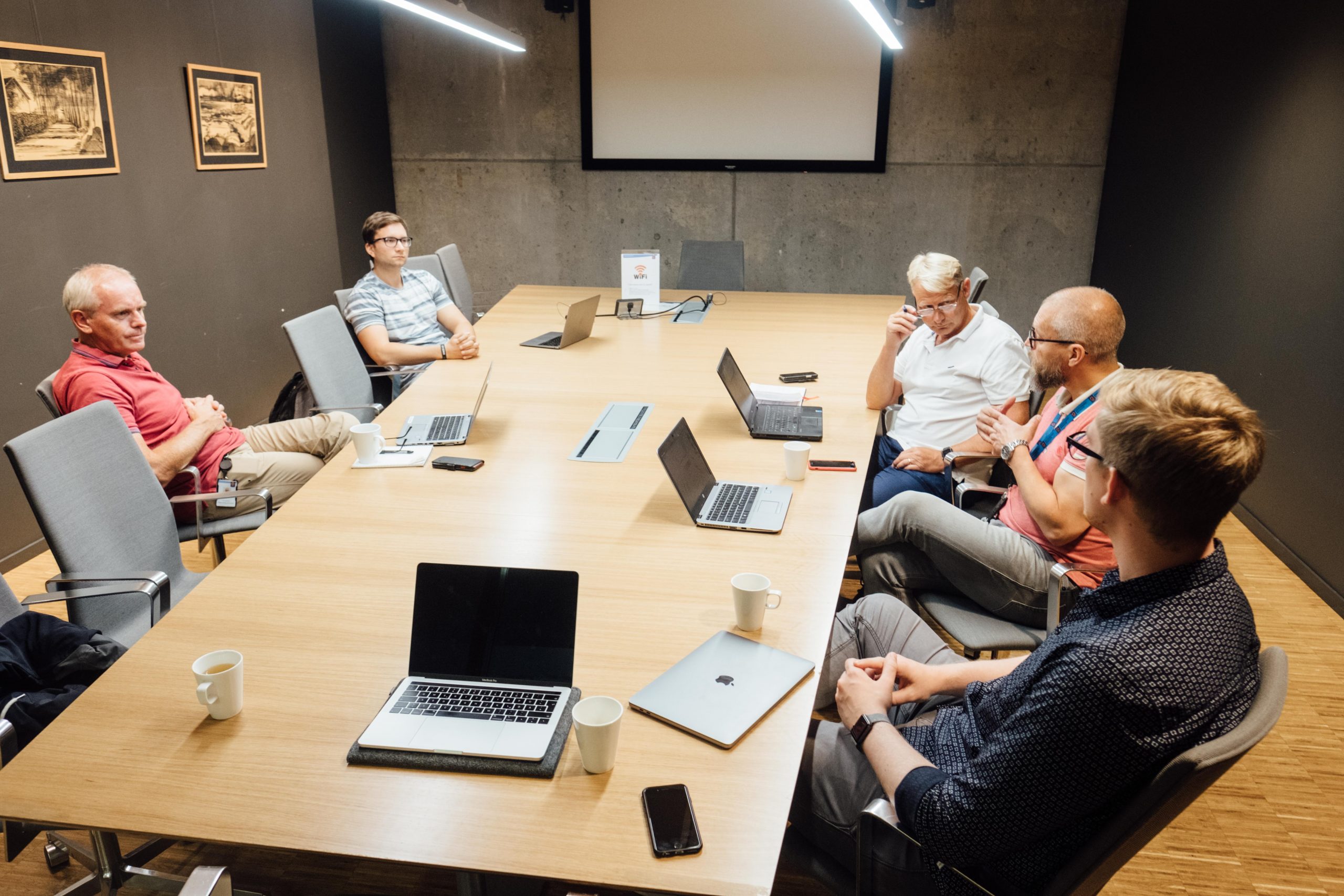
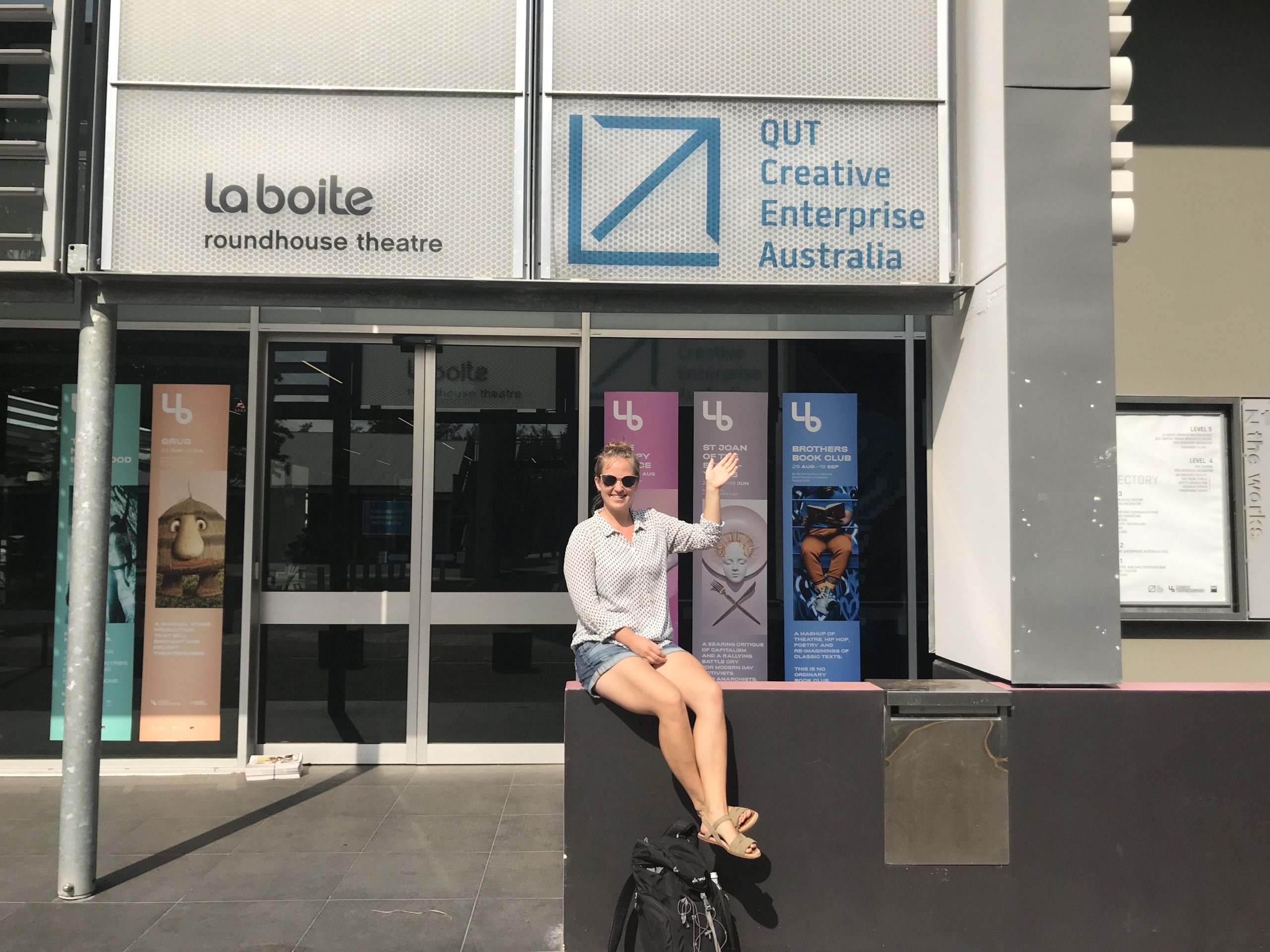


Secondment report #3
Uni DuE goes Down Under
From October 1 2019, to January 1 2020, I got the opportunity to travel to Brisbane, Australia, to work with our RISE_SMA partner Jean Burgess and Axel Bruns at Queensland University of Technology (QUT). My three months secondment period at QUT in Brisbane served multiple aims. The key focus of my stay was to investigate misinformation distribution on Twitter and the role of social bots. A less tangible but nevertheless equally important aim was to create lasting academic relationships and immerse in the work culture of QUTs Digital Media Research Center (DMRC).
Starting off my stay, I was given the chance to visit the AoIR conference 2019 which was held in Brisbane and organized by the RISE_SMA partner QUT. This not only gave me the chance to meet RISE_SMA partner Dr. Raquel Recuero from Universidade Federal de Pelotas and connect with her, but to also meet my temporary work-colleagues from the DMRC in a casual environment, to discuss common areas of interest.
Working on the set goal to investigate misinformation distribution, I met weekly with Axel Bruns and his colleagues Tim Graham, Dan Angus, Brenda Moon, Ehsan Dehghan, and visiting PostDoc scholar Tobias Keller. Together with this group of experts the following two research questions were developed:
1. Concerning misinformation, what is shared on Twitter?
2. Who shares it [bot or human]?
3. Does the theory of motivated reasoning explain the sharing behavior?
As part of a bigger data collection, we selected one hyper-partisan right-wing media outlet that we analyzed.
Tweet characteristics as well as the respective news source were manually coded and analyzed. I plan to present the results at MISDOOM 2020 in Leiden.
During my stay at QUT in Brisbane, I also met with Kari-Anne from University of Agdar and Kim Hendrik Gronert and Dag Frantzen from the municipality of Kristiansand who came to visit in November. Our focus in those meetings was to establish a shared understanding of how both sides, academia and municipality, can learn and benefit from each other. We also looked at recent happening in the commune Kristiansand which involved a Quran burning and fierce reactions on social media.
Probably the greatest outcome of my secondment, next to academic achievements, was connecting with international scholar. Because I was able to stay for a considerate time of three months, I felt fully immersed at QUT. I was not only part of the scheduled RISE-SMA meetings, but was invited to guest lectures, talks, PhD workshops, DMRC presentation and meetings, but also celebrations. I can only thank my supervisor, Axel Bruns, and my PhD peers who made the stay more than worthwhile.
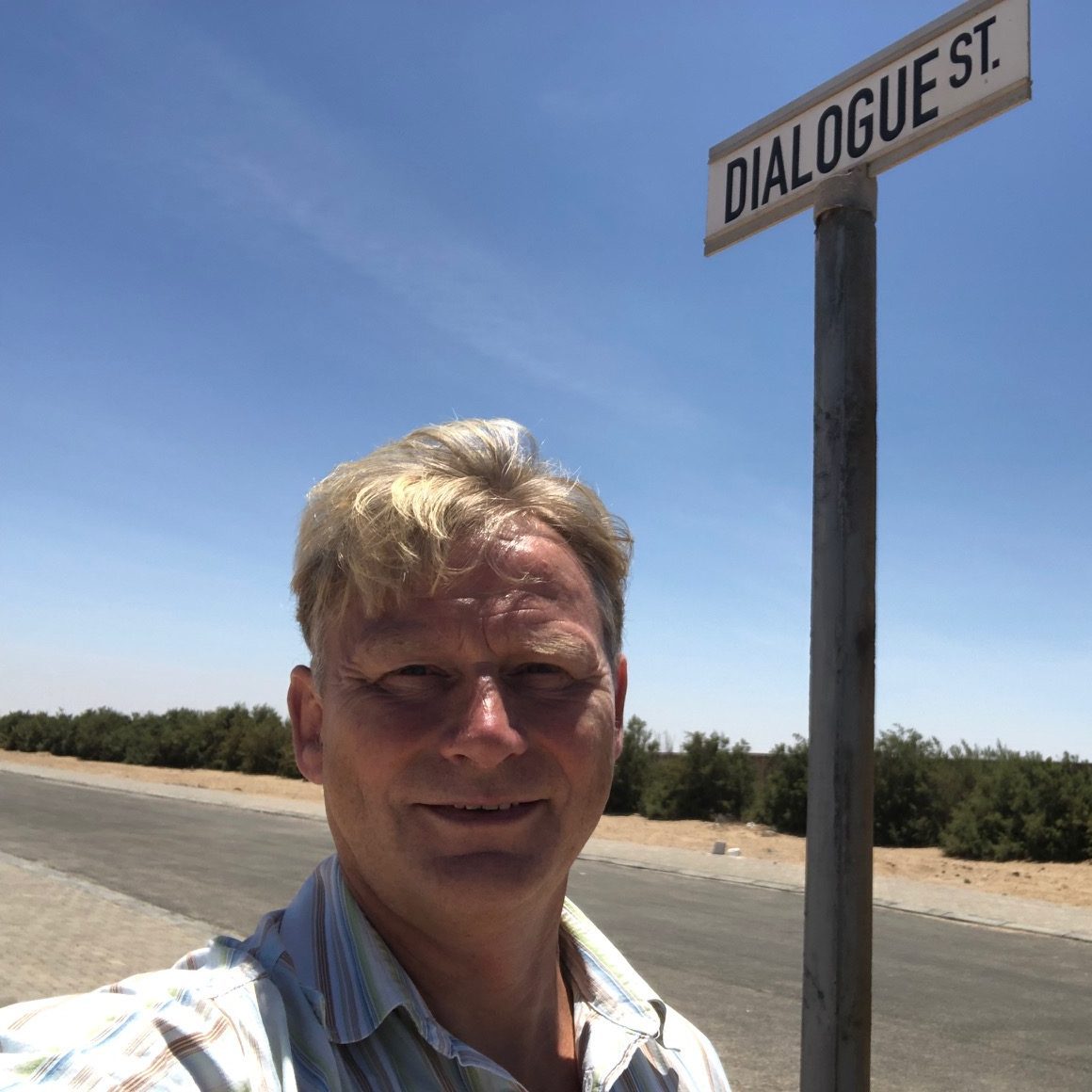
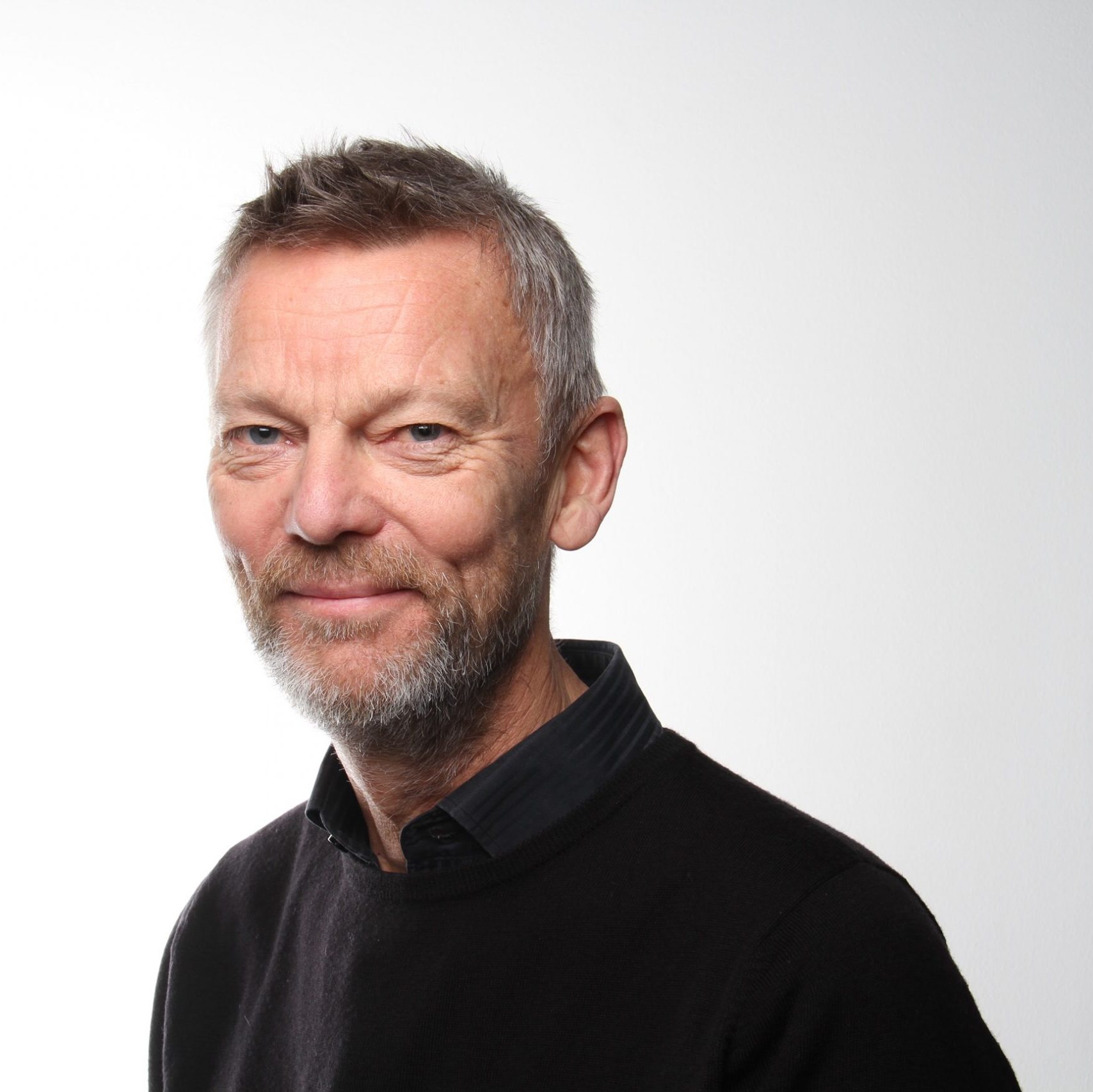

Secondment report #2
#Team-Kristiansand #Sigurd #Kristin #Petter-in #Duisburg-Essen-introduction-to #PROCO//wp3//SMA tool for municipality #requirement-analysis.
In December 2019, a team from the Municipality of Kristiansand got the opportunity to travel to the University of Duisburg-Essen (UDE), Germany, with the RISE_SMA project.
The travel to UDE from Kristiansand was done by airplane via Copenhagen. We were ready on place before lunchtime, where we met Anna-Katharina Jung, M.A. Research Associate and PhD student at the Research Group Professional Communication in Electronic Media / Social Media (PROCO) supervised by Prof. Dr. Stefan Stieglitz.
On our first day we had a meeting with Jennifer Fromm and Tobias Kroll, who introduced us to a research project with the Emergency Managemant Agency Johanniter. The output of this project allowed us to gain a better overview what an EMA can derive from a social media analysis and how the data can be visualized for practical purposes.
On our second day Anna-Katharina facilitated us through a workshop which looked at tasks from the work package 3 of our workplan. As the work package 3 is a very technical work package, which aims of the development of a prototype for SMA. Together with the UDE we collected the requirements that we the municipality of Kristiansand have concerning a social media analytics tool.
In the workshop we developed different personas for managers and employees at the Municipality Kristiansand and worked on a use case about a potential measles outbreak at a Steiner school in Kristiansand. It would affect several departments of our Municipality (e.g. Crisis, Youth and Health) and include a lot of different actors both from the Municipality and the citizen (teacher, children, parents etc.). Next to the personas we also developed potential user stories and derived problems and opportunities, which would come along with the introduction of a social media analytics tool.
Last but not least, the team spent the weekend to walk around in Duisburg and to enojoy the time at the traditional Weihnachtsmarkt in Duisburg and Cologne. Before we needed to return home, Tobias Kroll was so nice to give us a short city tour through Duisburg and we discovered together e.g. the Salvator Church and the Duisburg Harbour.
Secondment report #1
From Kristiansand to Australia
On November 15, 2019, Kim Henrik Gronert, Dag Morten Frantzen from Kristiansand kommune and Kari Anne Røysland from UiA, travelled to Brisbane Australia. Their secondment to Australia consisted of visits to both QUT in Brisbane and University of Sydney, where they met with the subgroups Fake News and Narratives and Crisis Communication.
They are working on a case study of a recent incident that took place in Kristiansand. In this case study, the group is looking at converstions in social media channels like Twitter, Facebook, Instagram and YouTube. Also, they are looking at the comments related to news articles in mainstream media. The results from this case study will be relevant to be aware of similar incidents in the future. So far, the conversation has escalated after the incident, and the word has spread to other parts of the world. This could possibly lead to new dangerous situations, and it would be a great benefit for the municipality and police to be aware of conversations and possible conflicts like these.
During their secondment they have been participating in relevant workshops and met with researches at the two institutions. Further research will within the research group Fake news and Narratives consist of a research paper on spillover effects and and a research paper on the YouTube videos.
